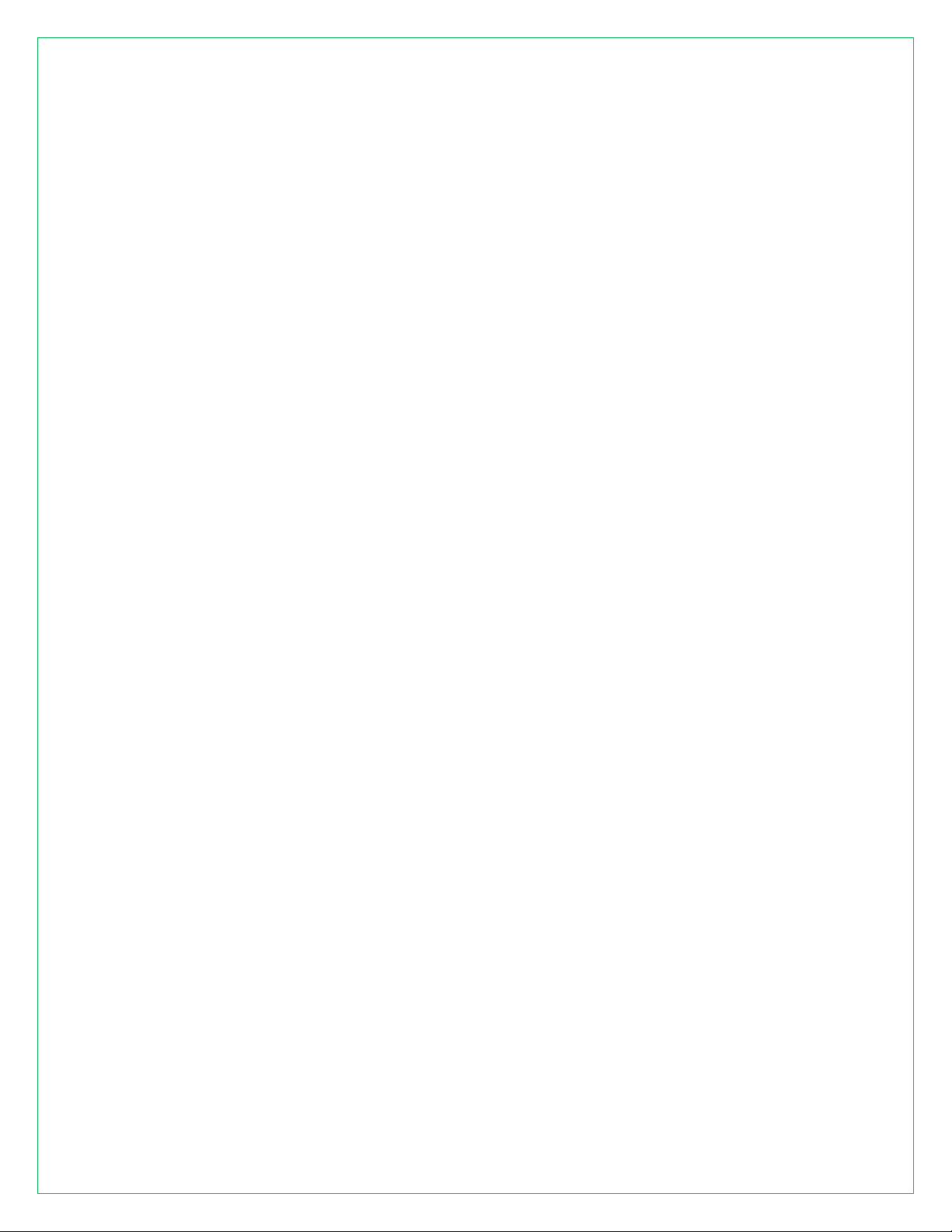
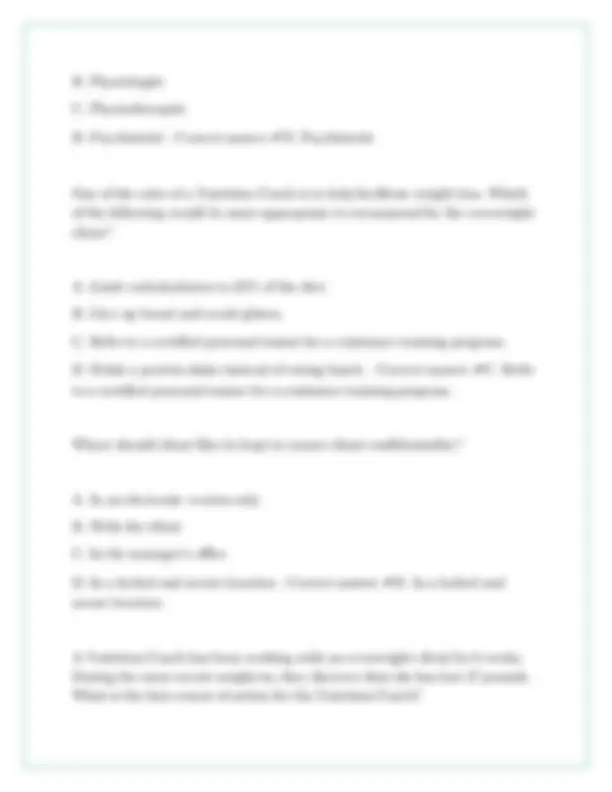
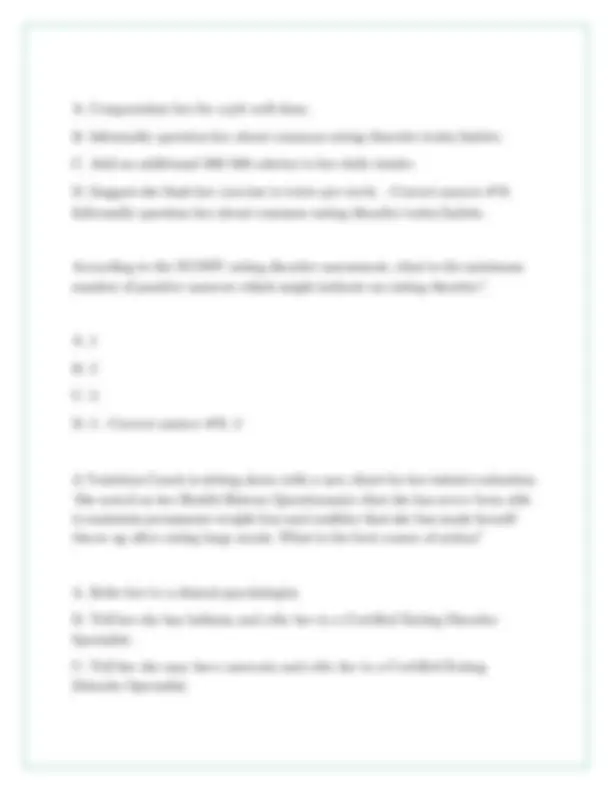
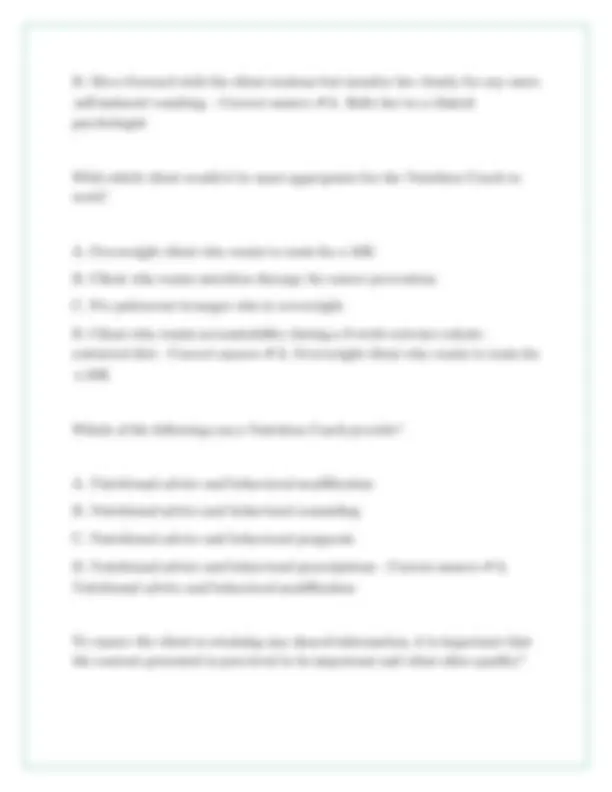
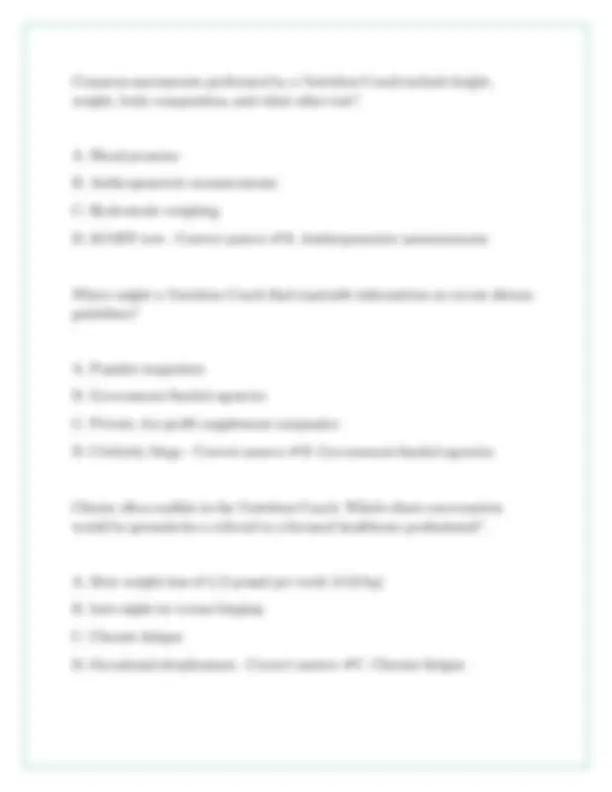
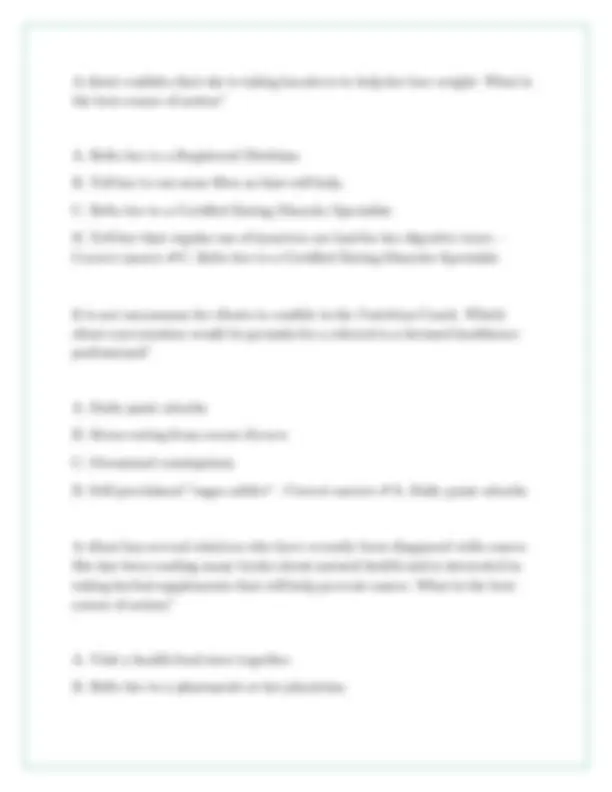
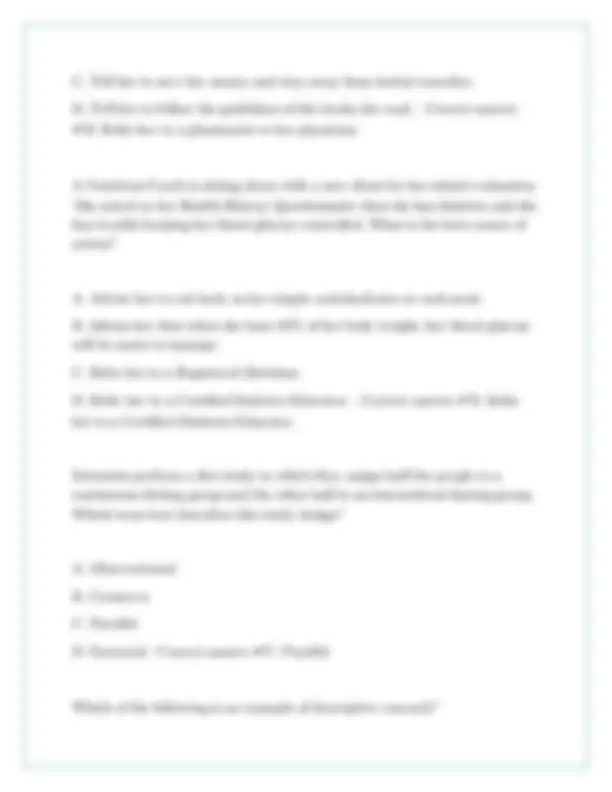
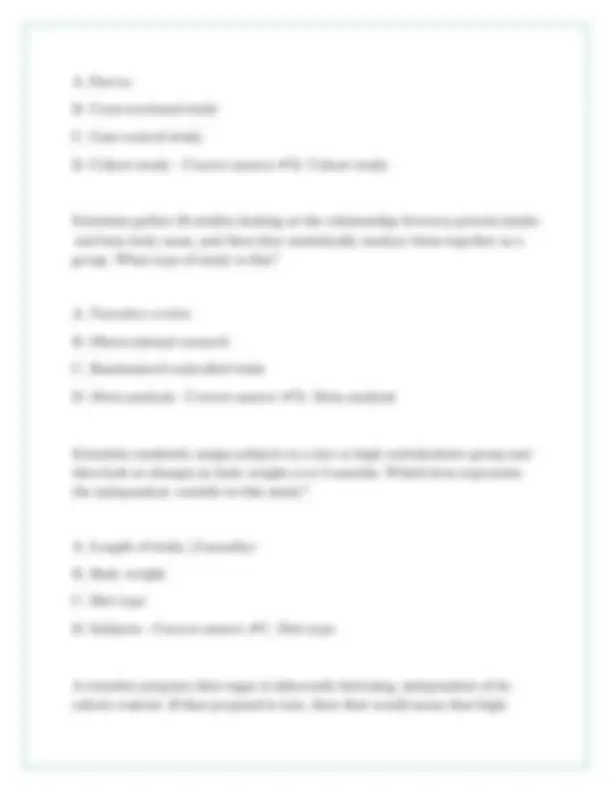
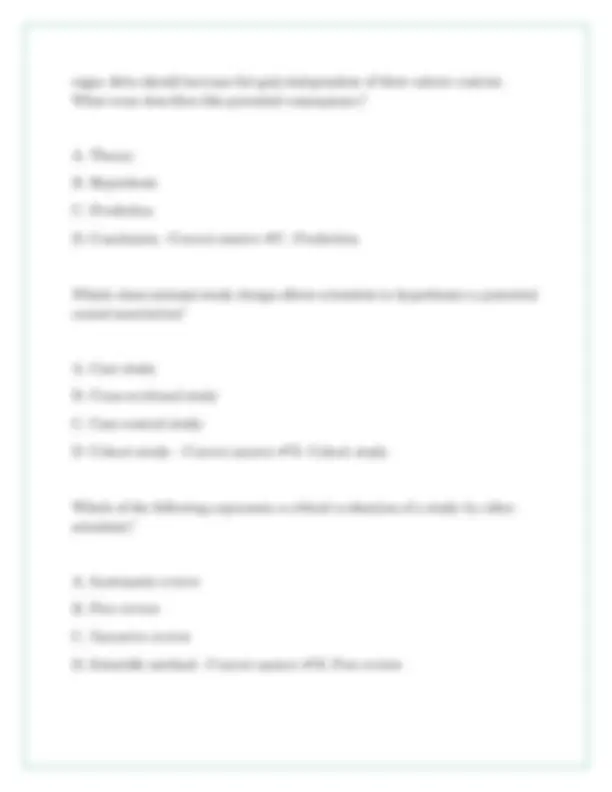
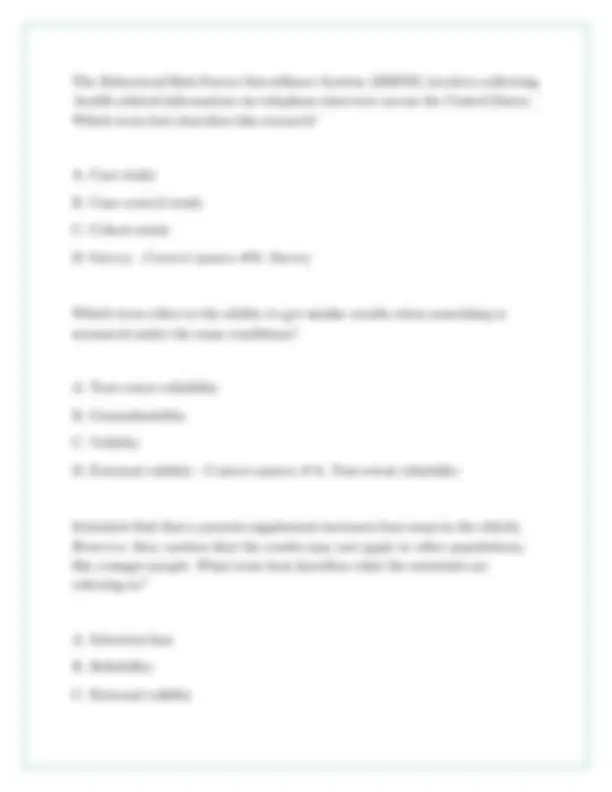
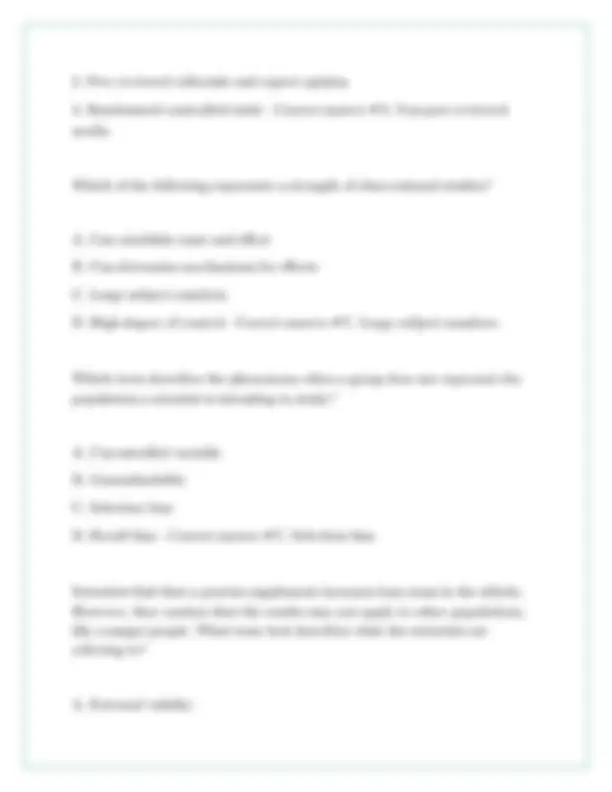
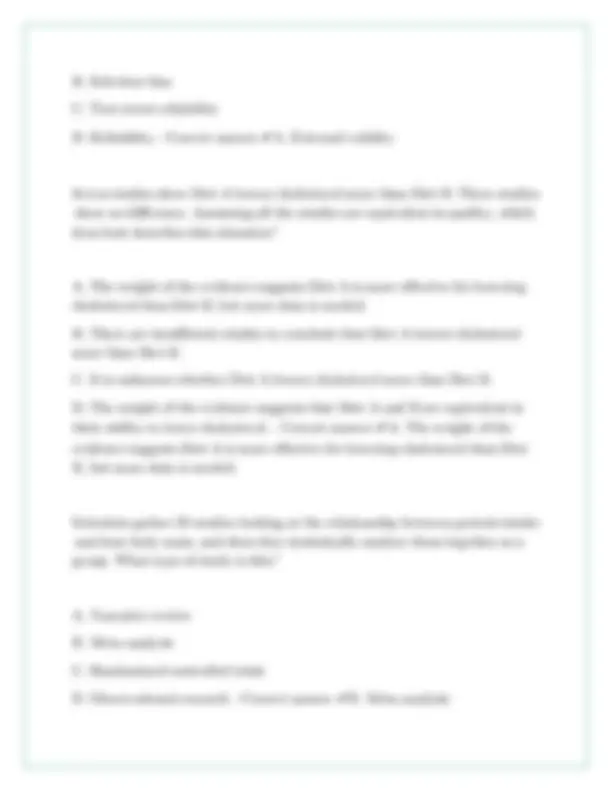
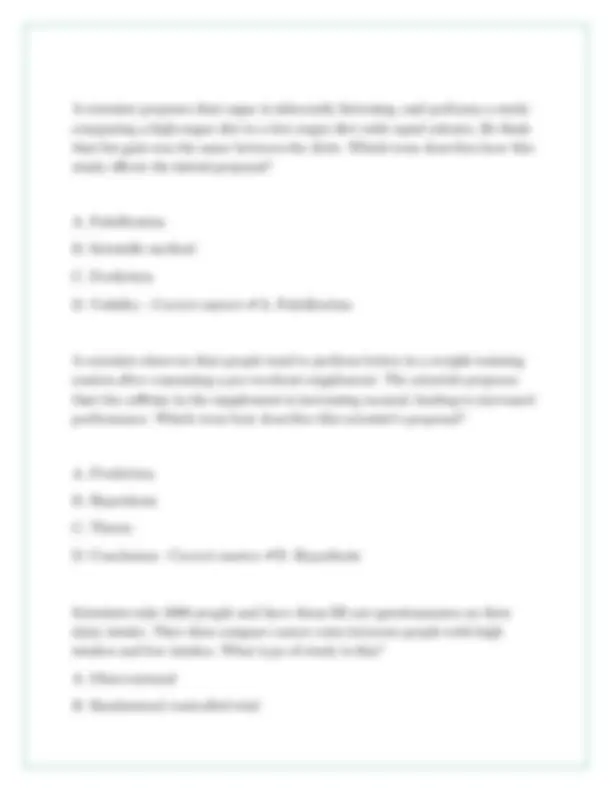
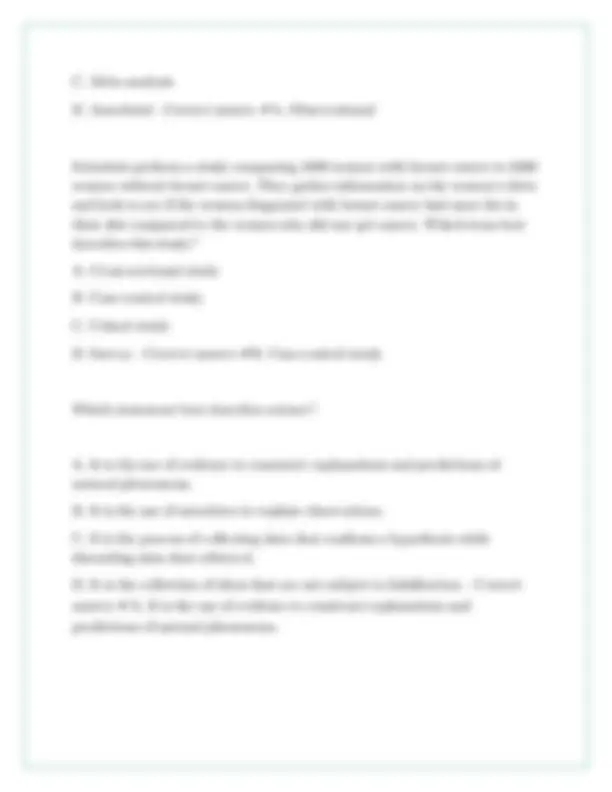
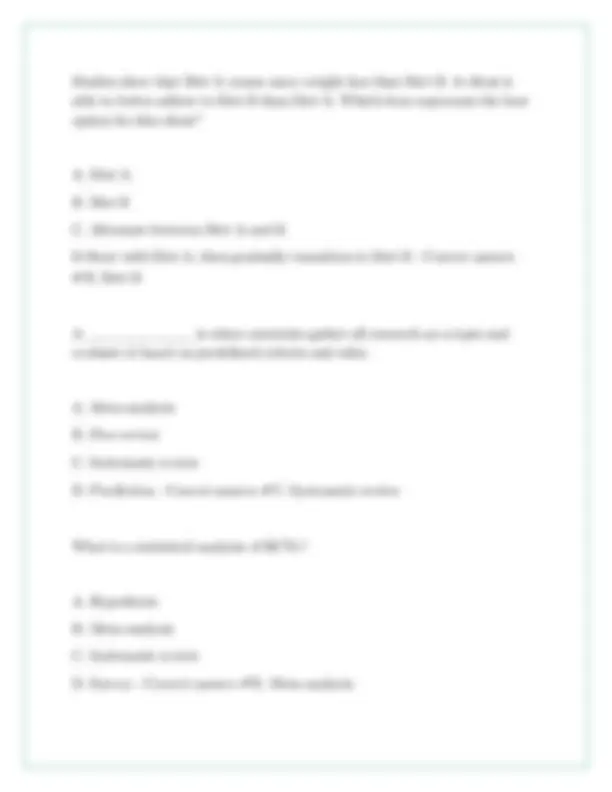
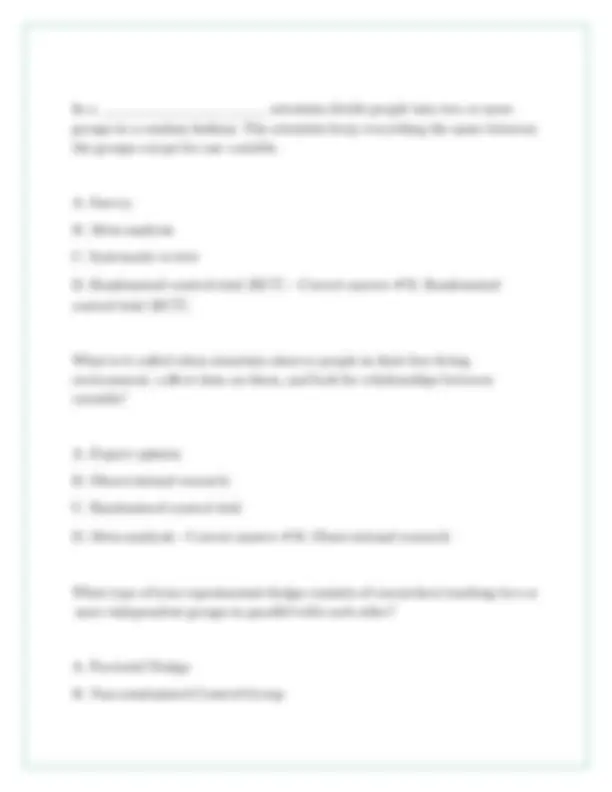
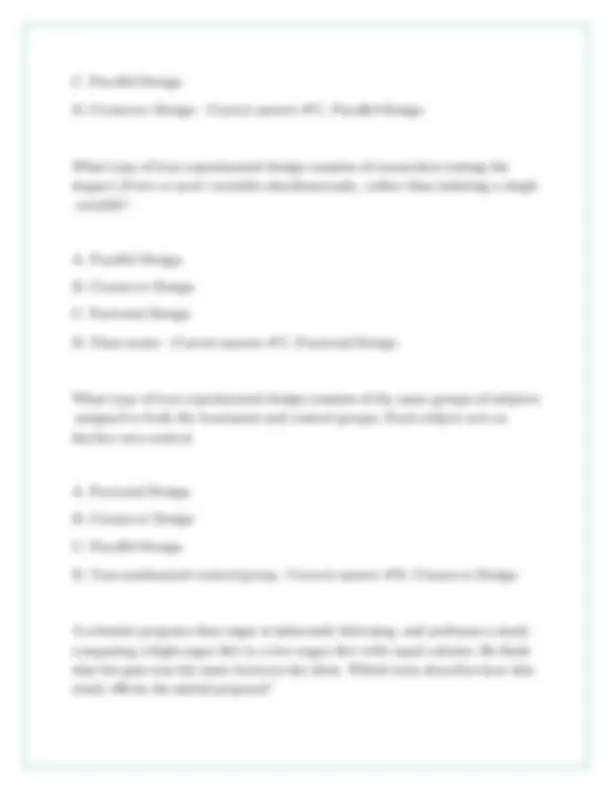
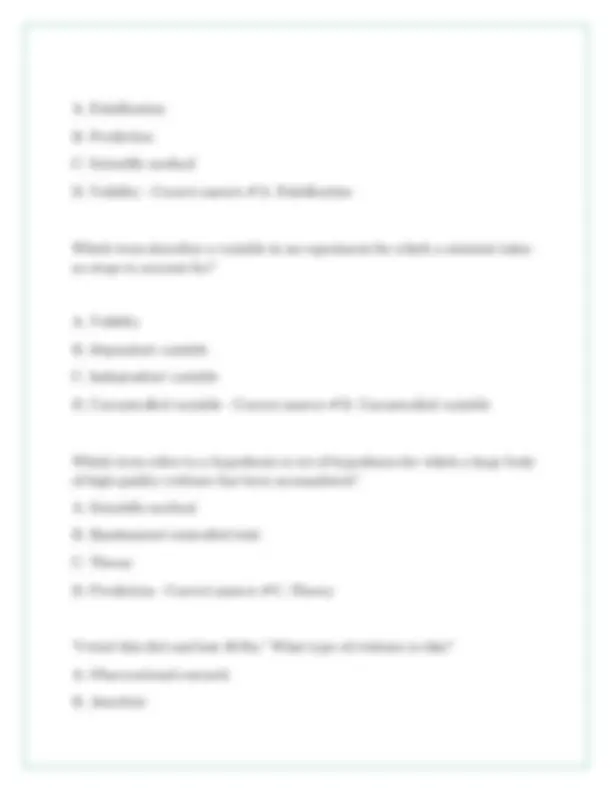
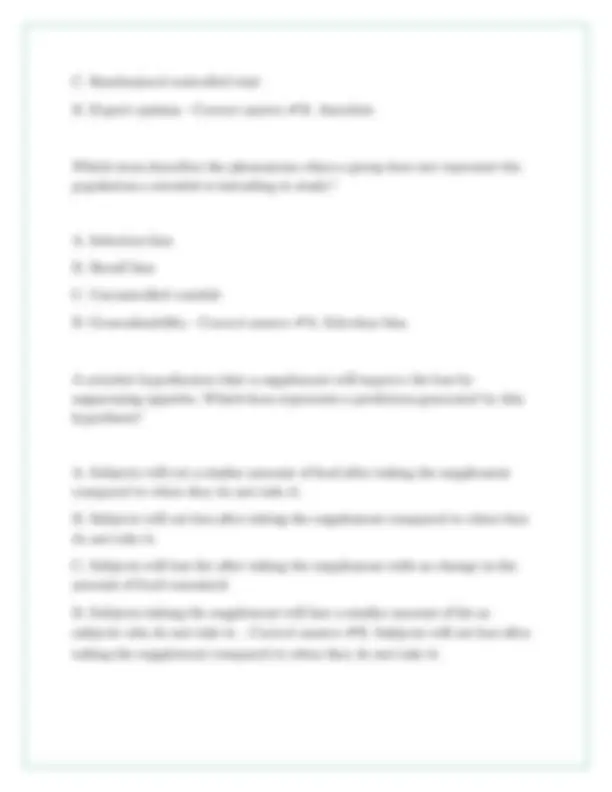
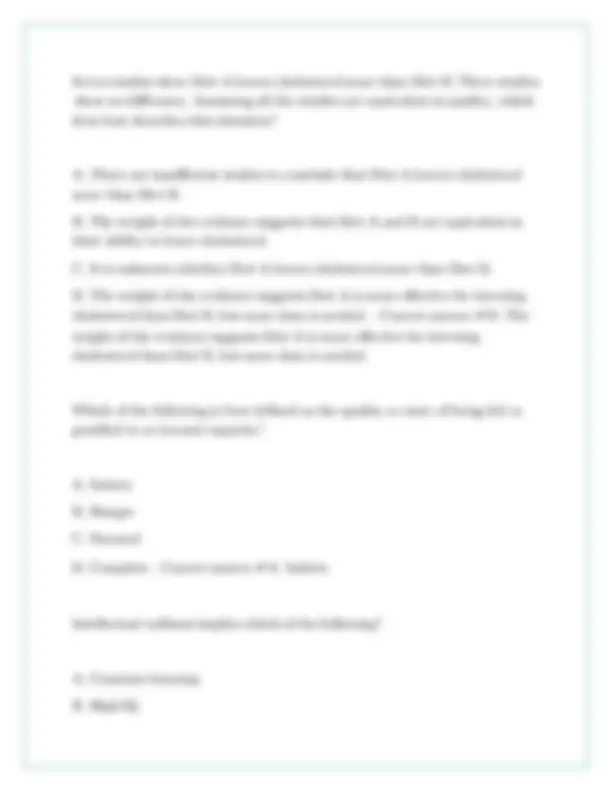
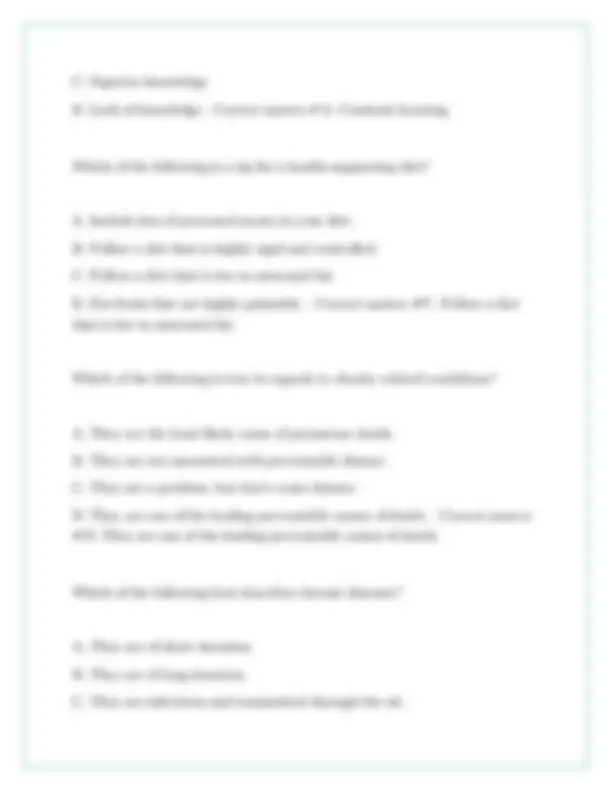
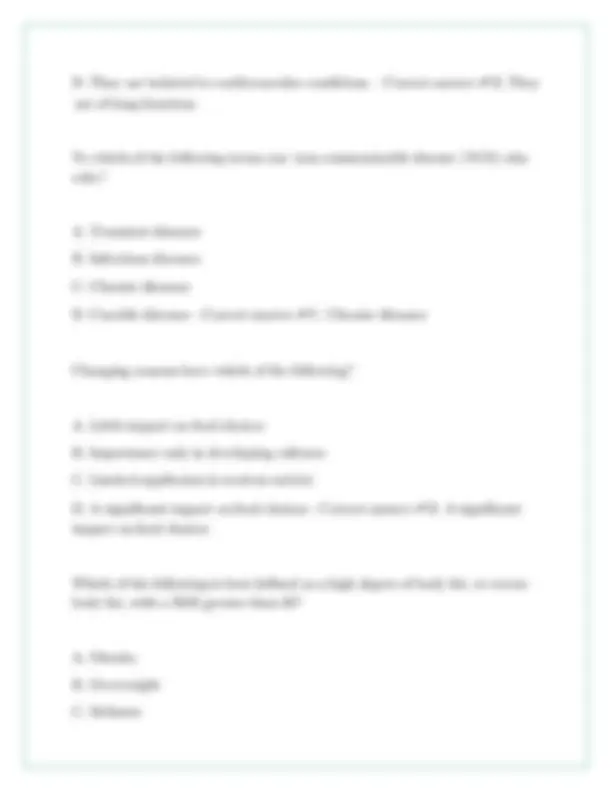
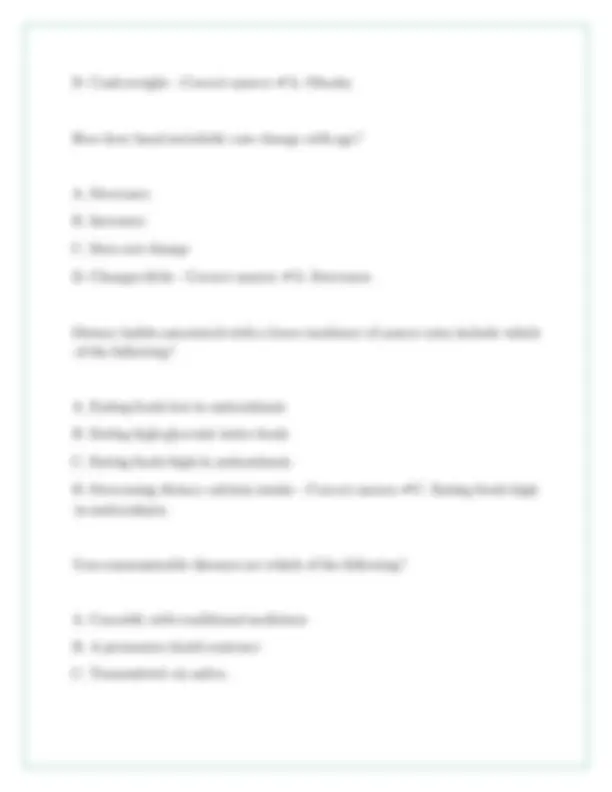
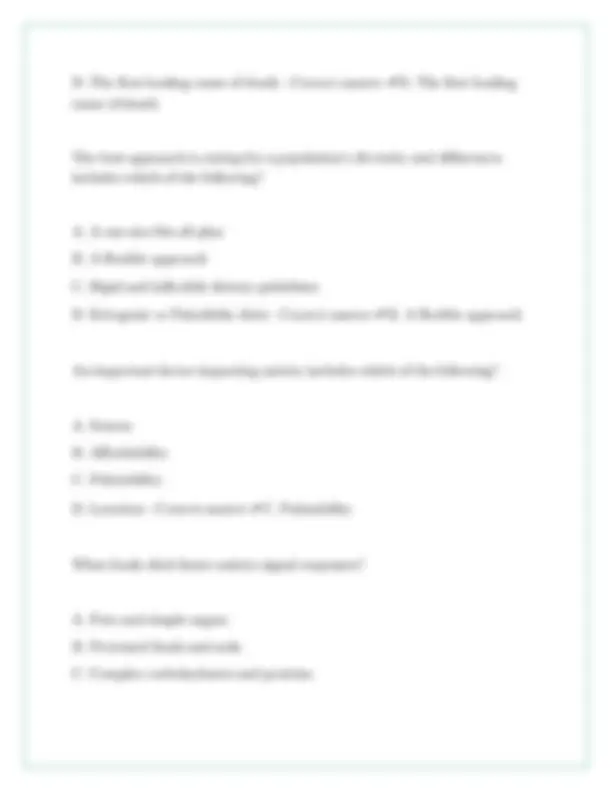
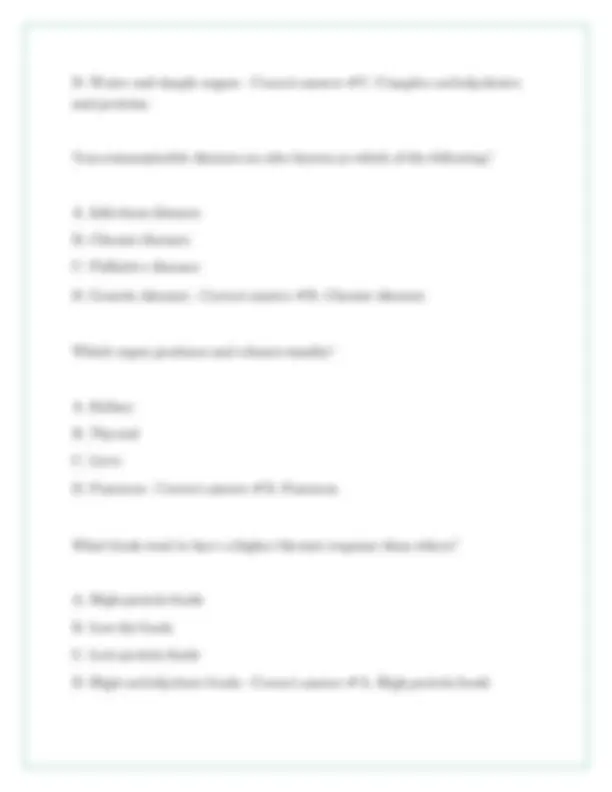
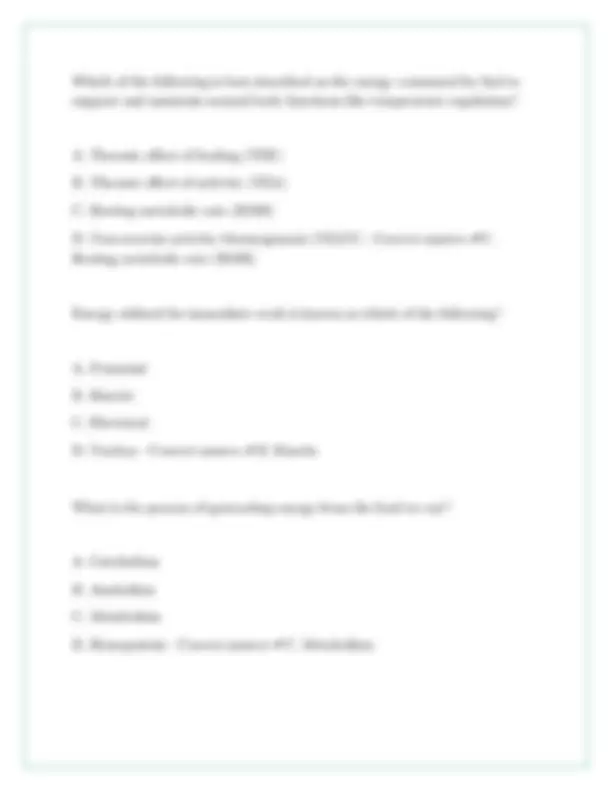
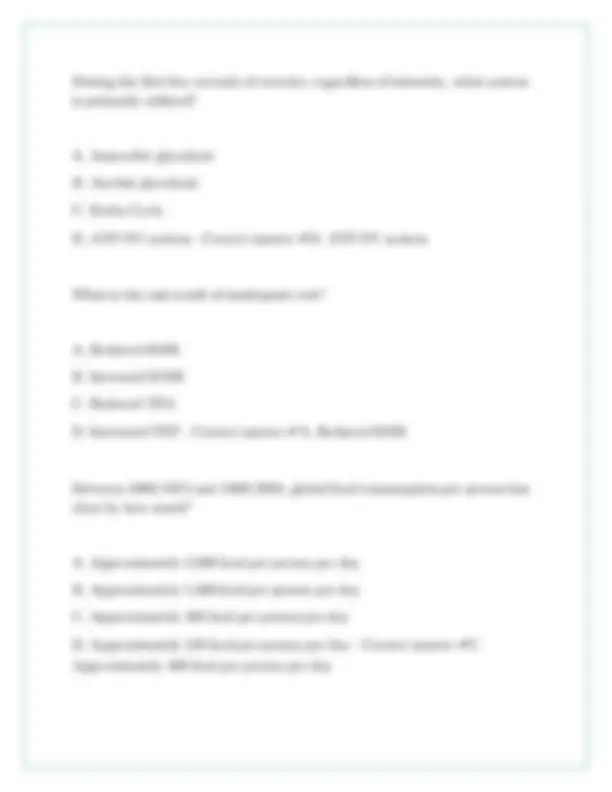
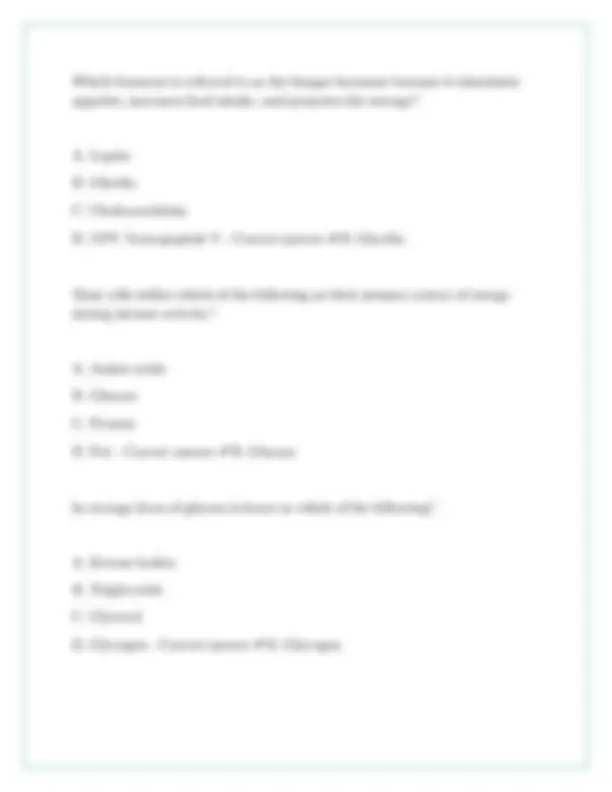
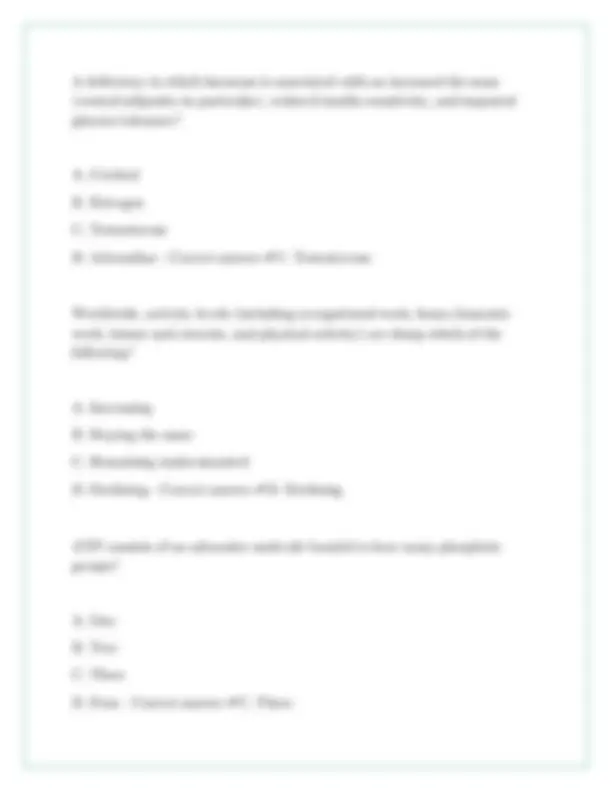
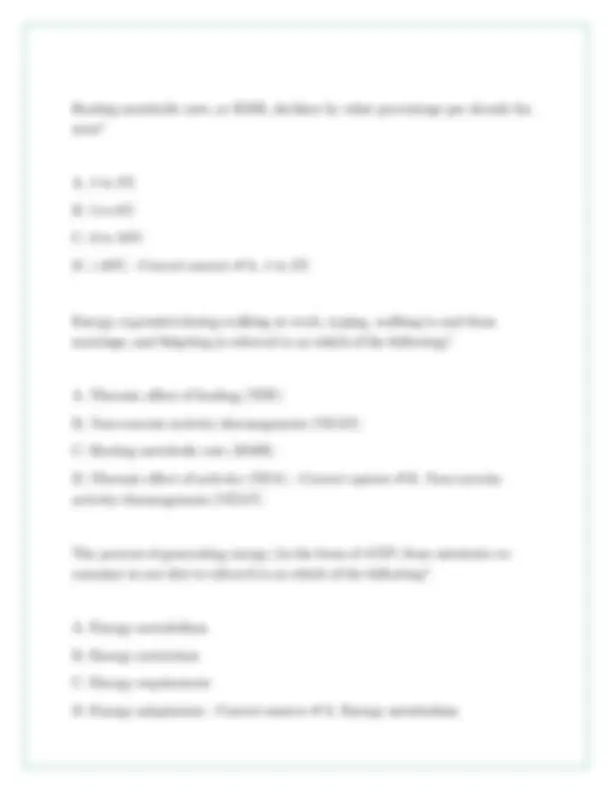
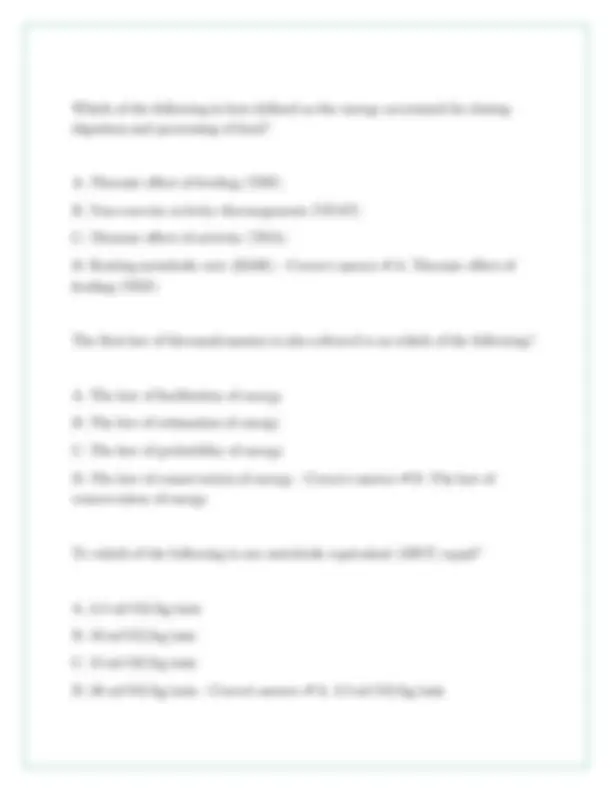
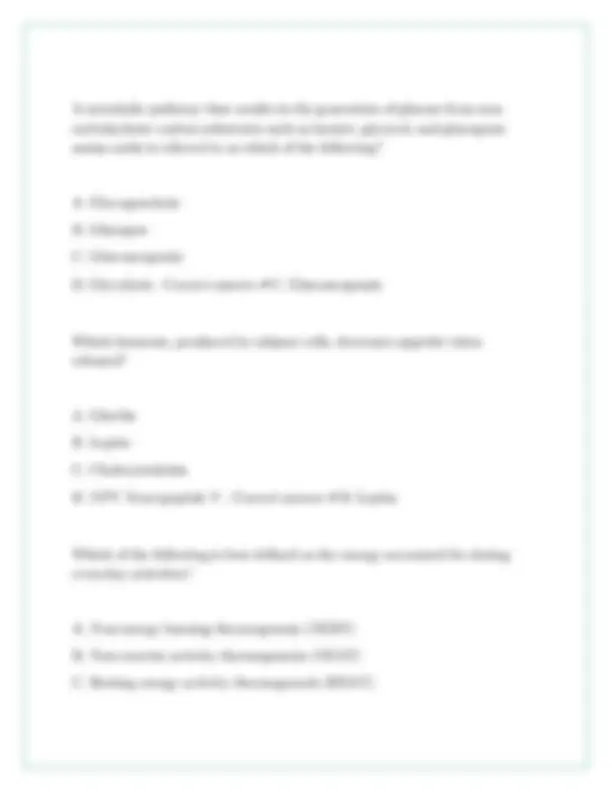
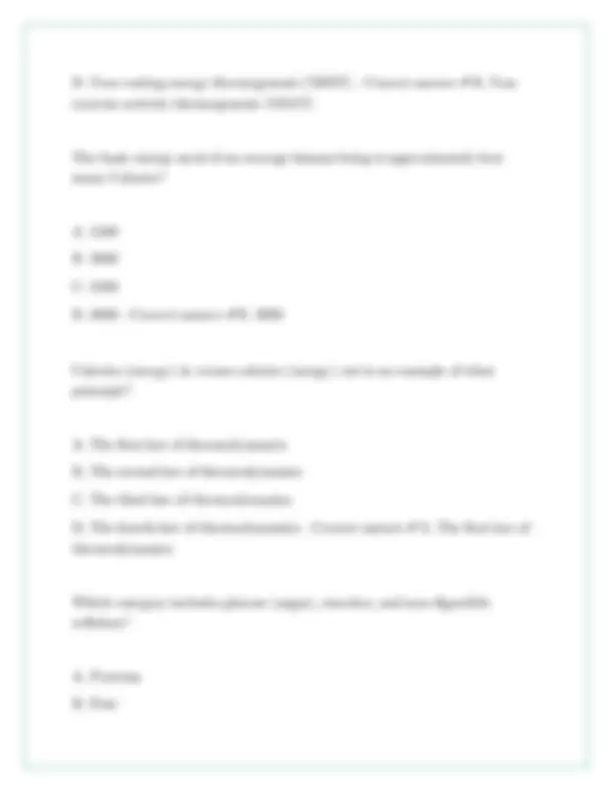
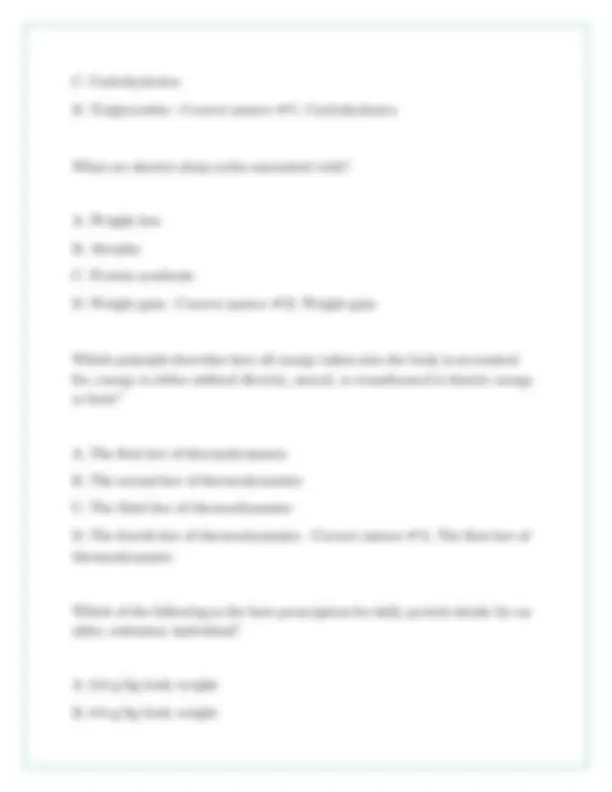
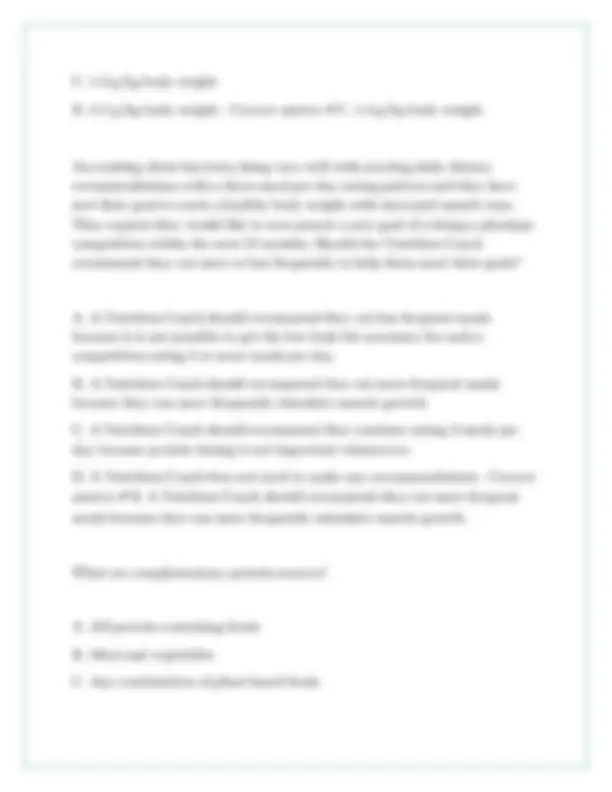
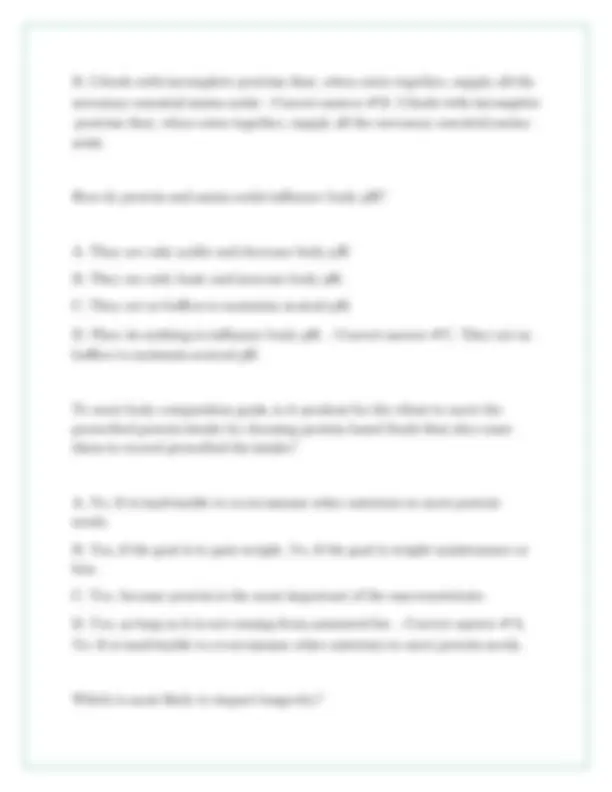
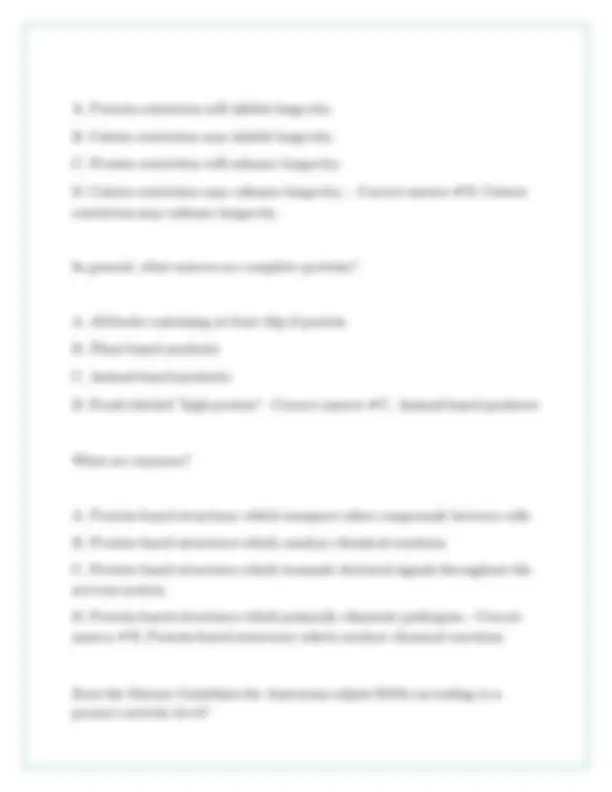
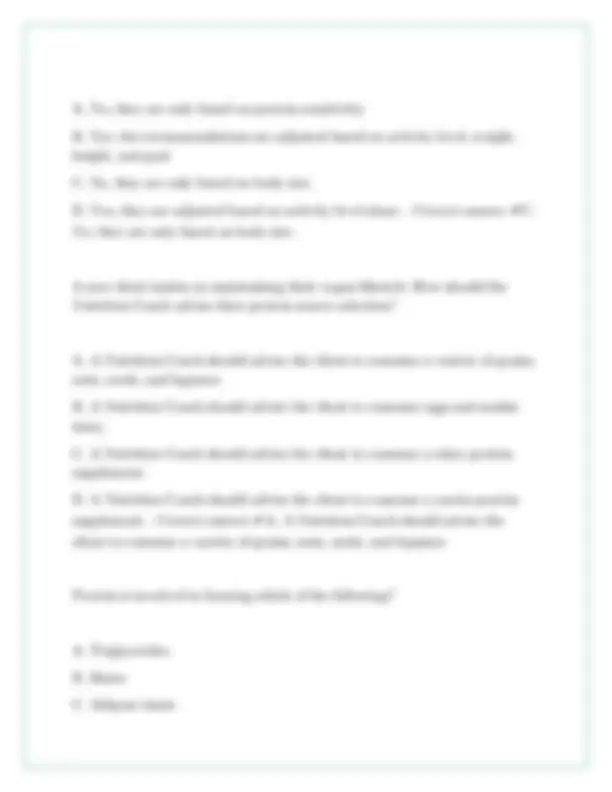
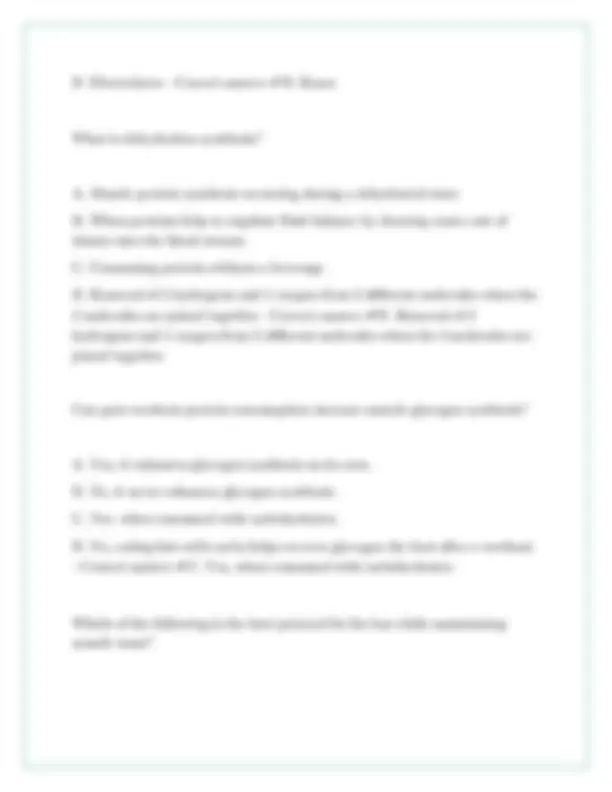
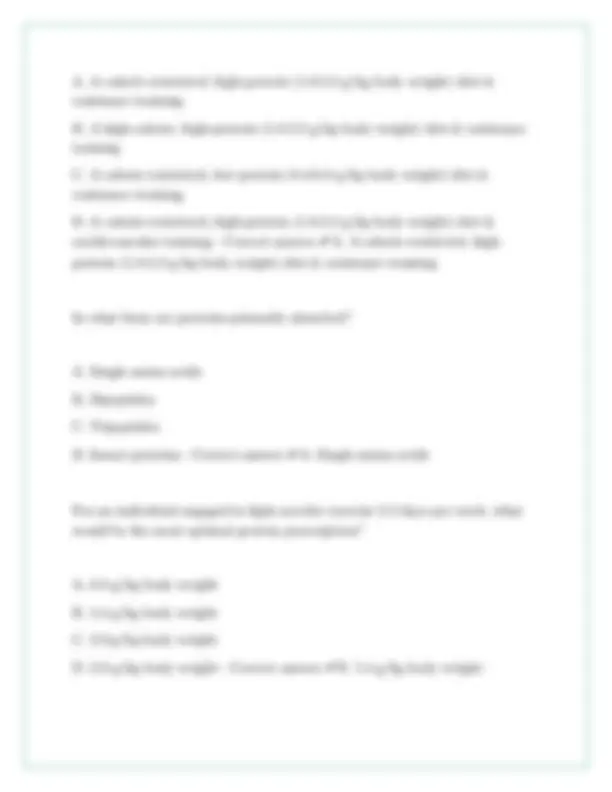
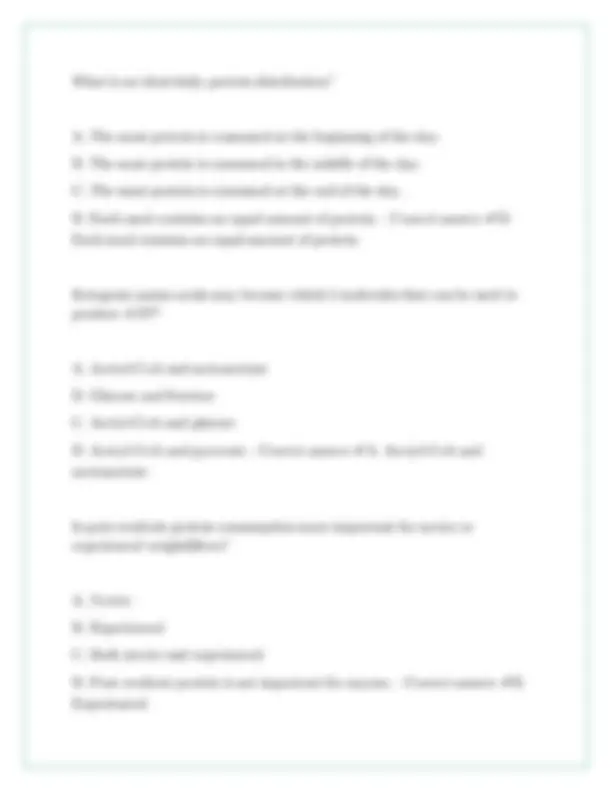
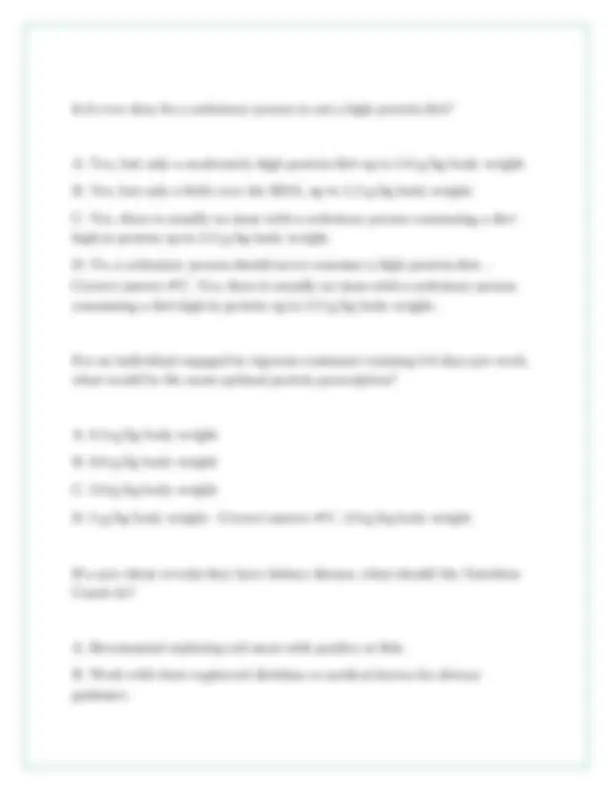
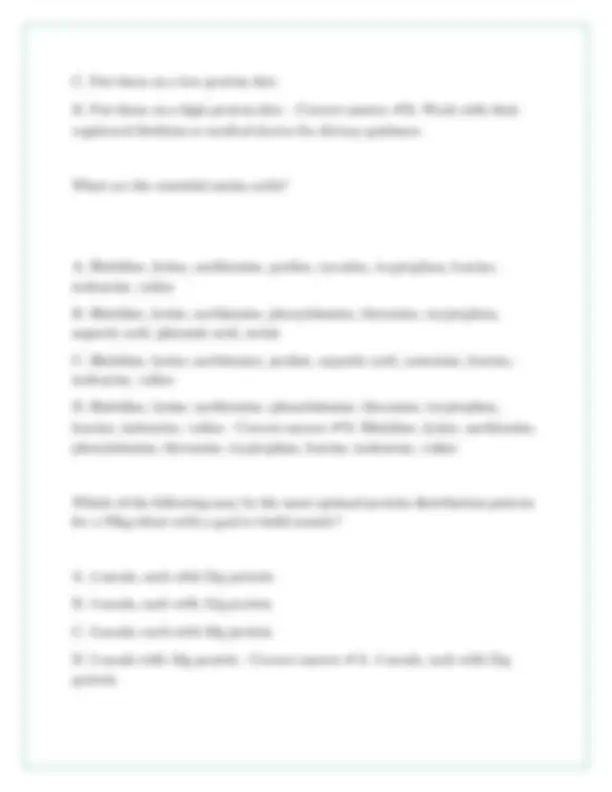
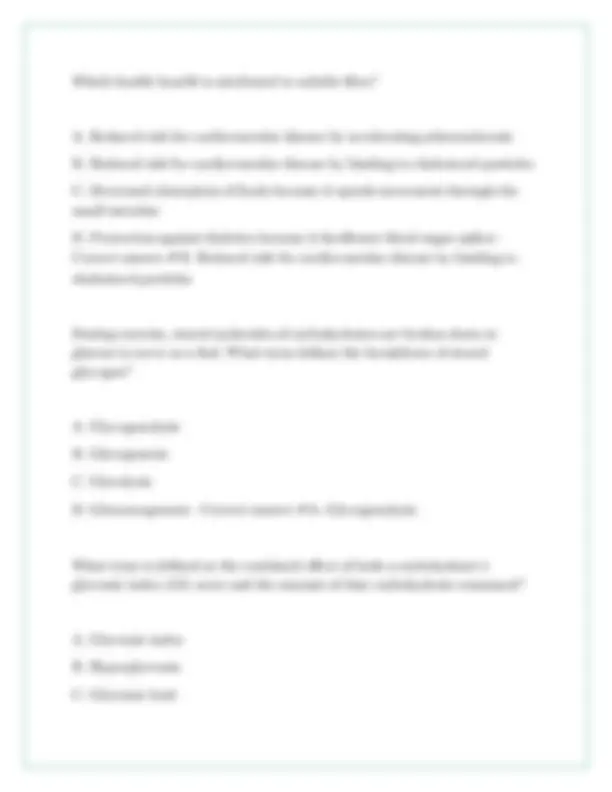
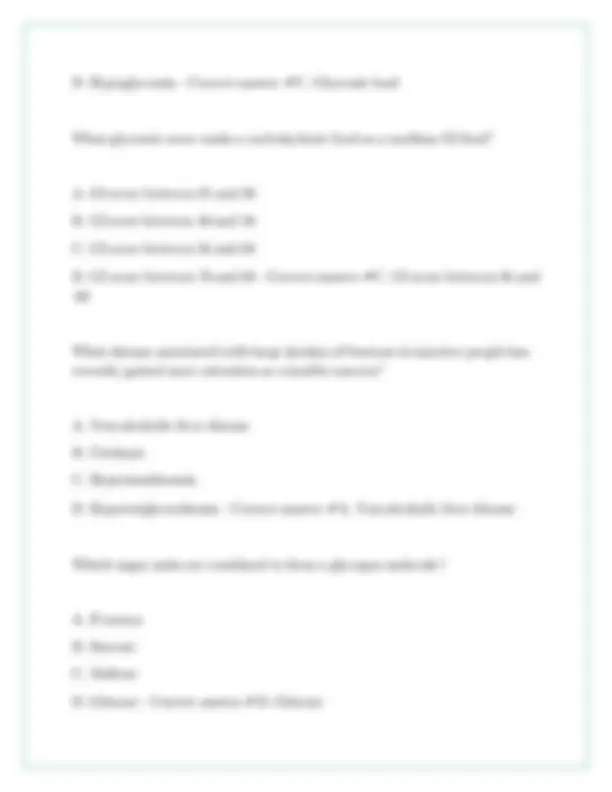
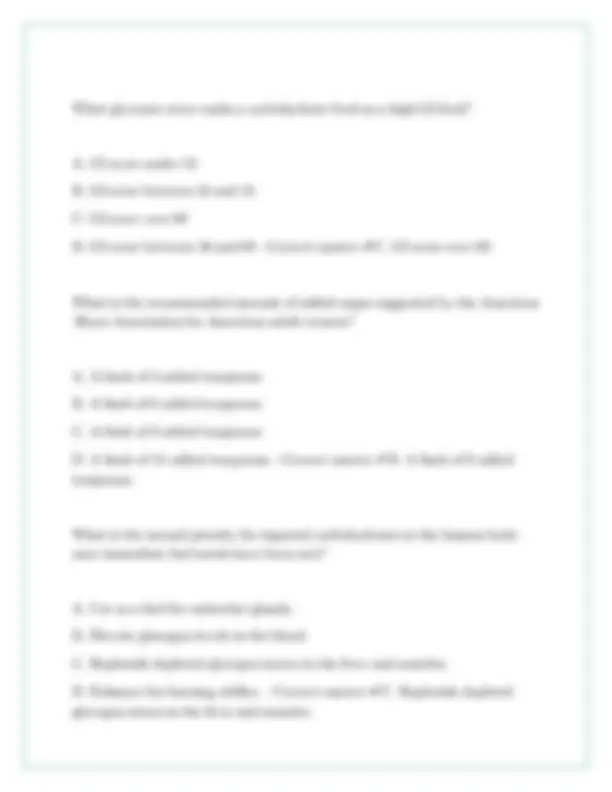
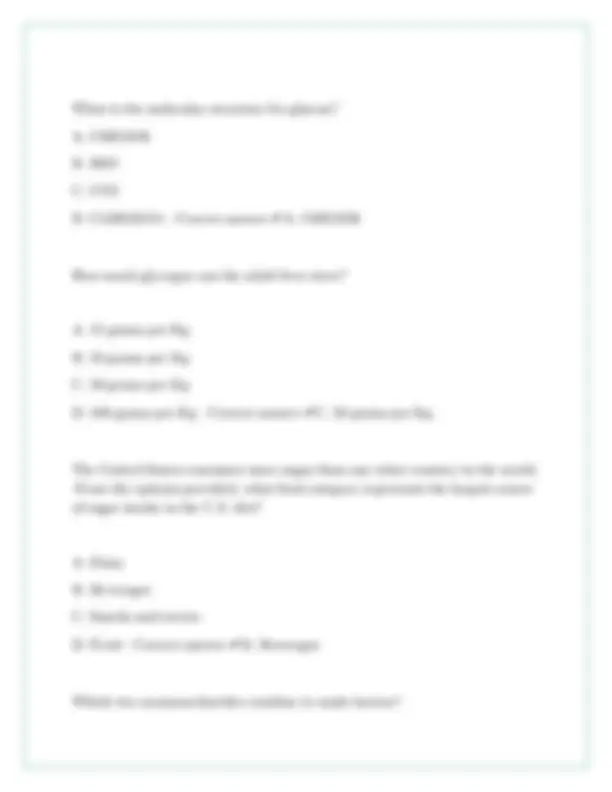
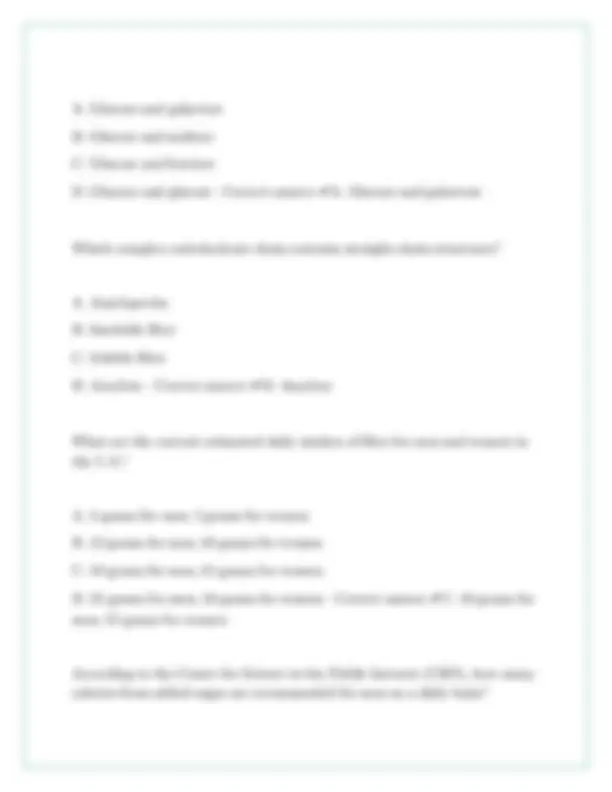
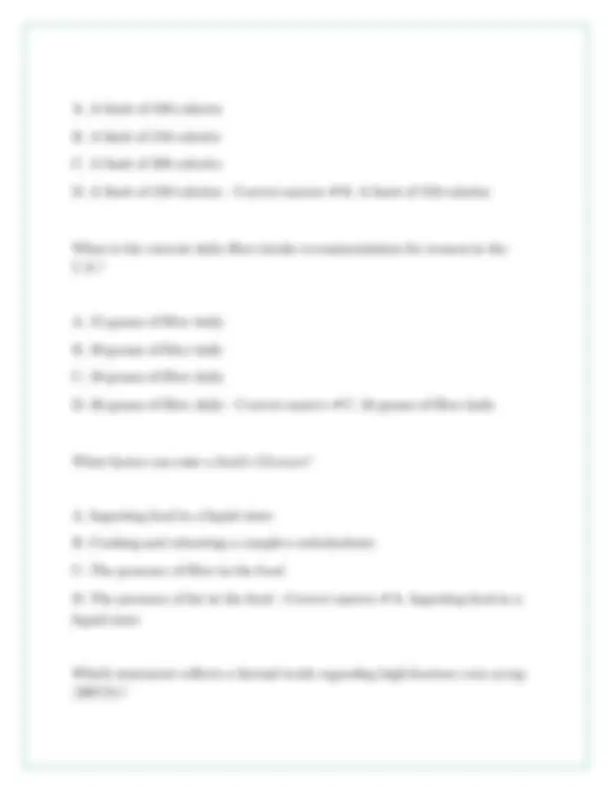
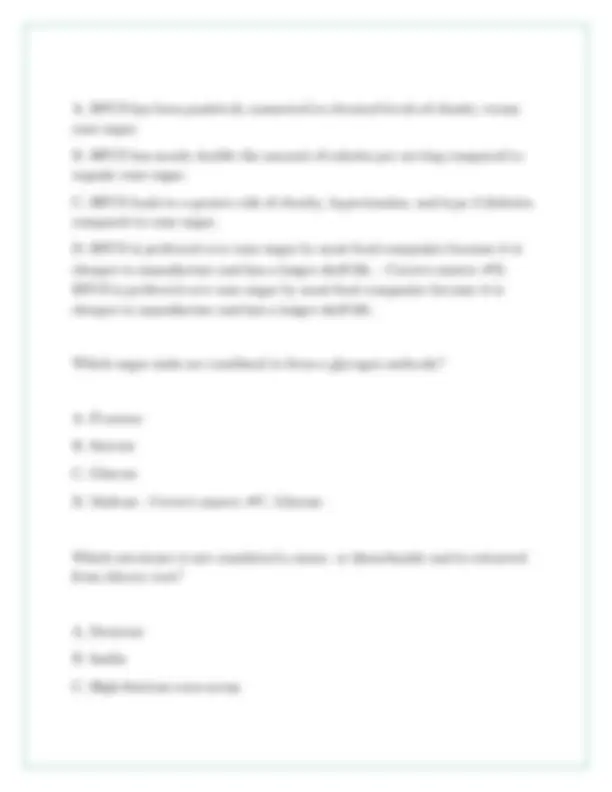
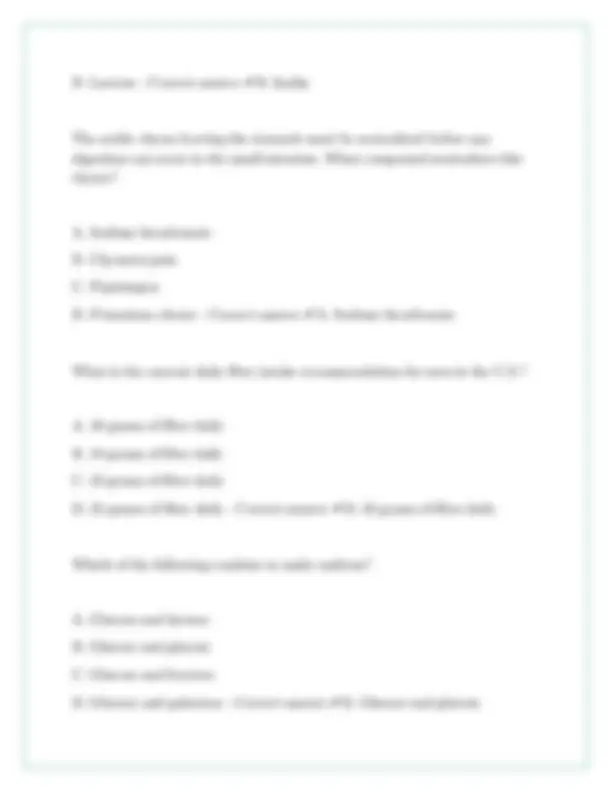
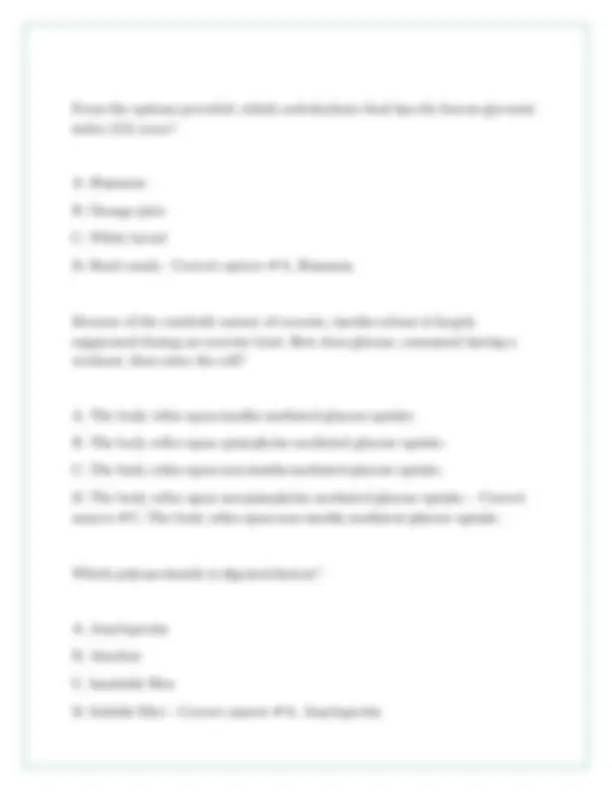
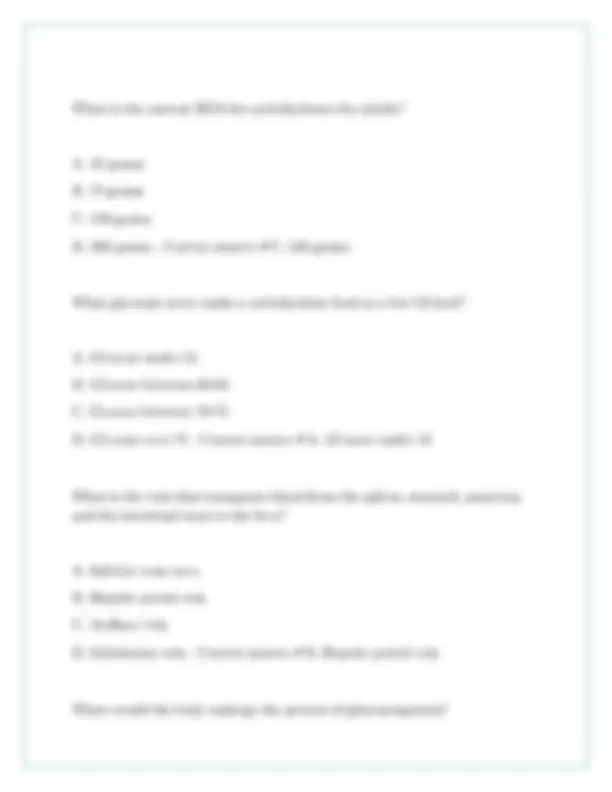
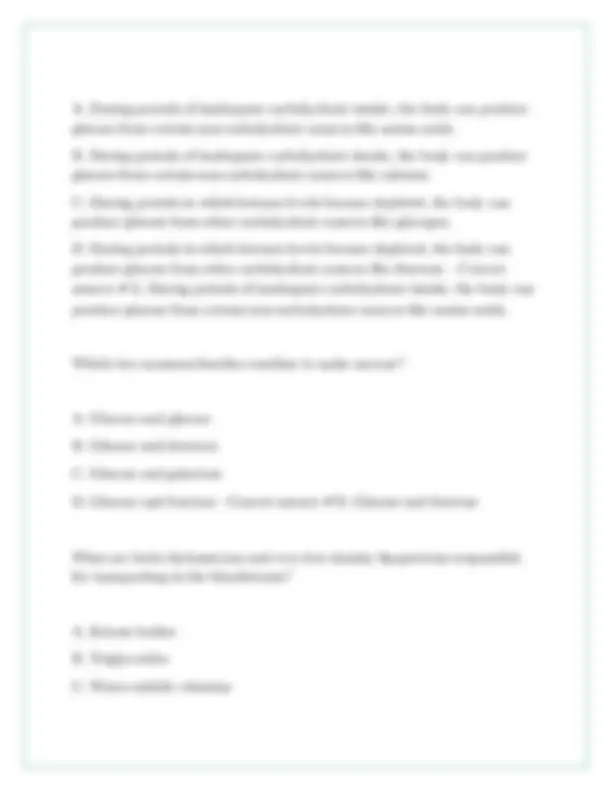
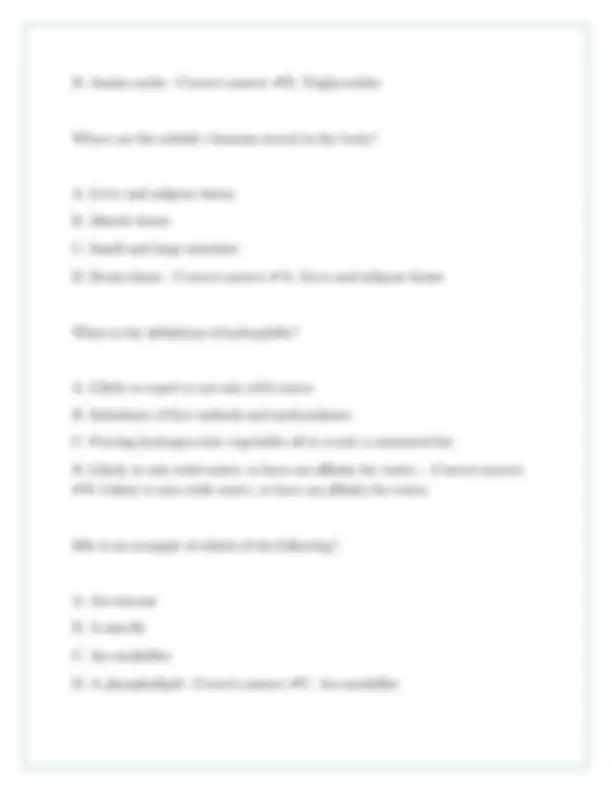
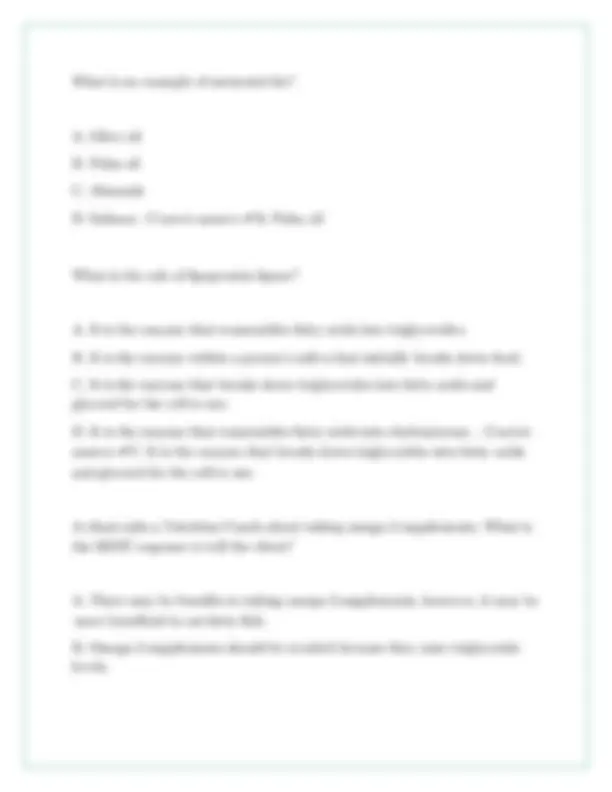
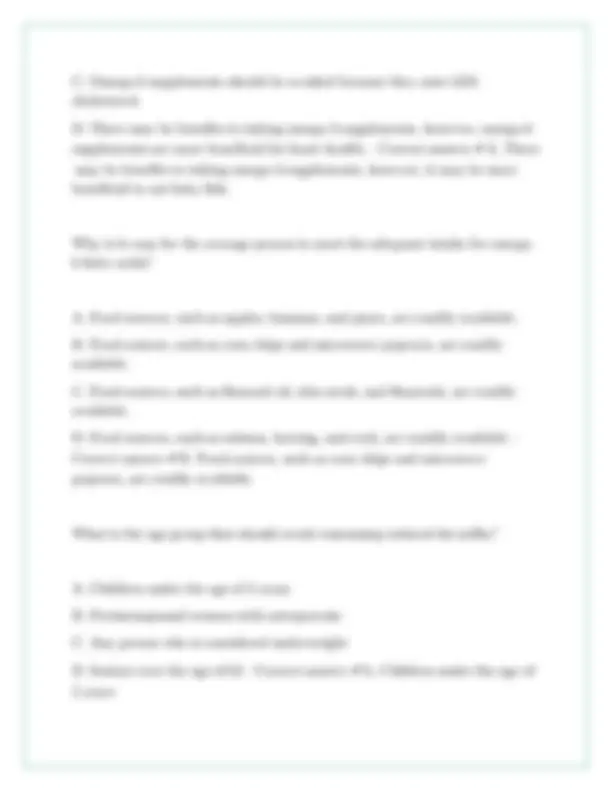
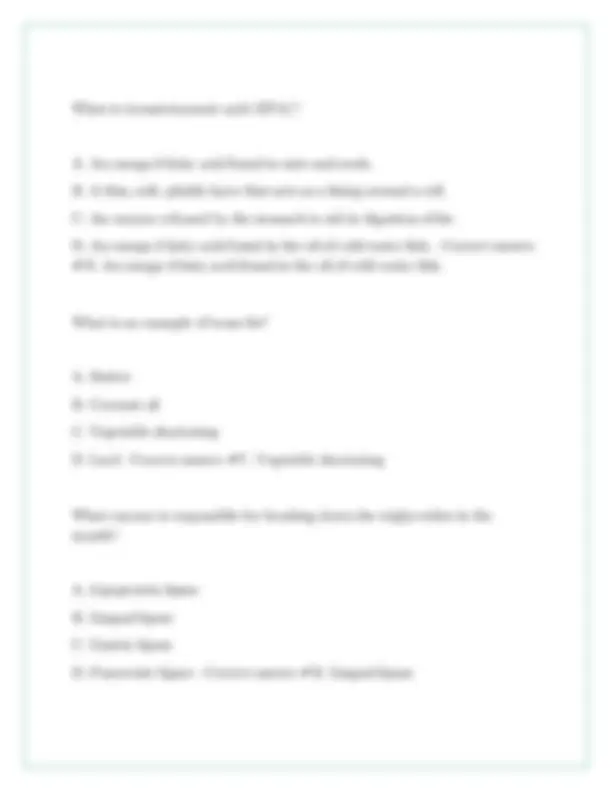
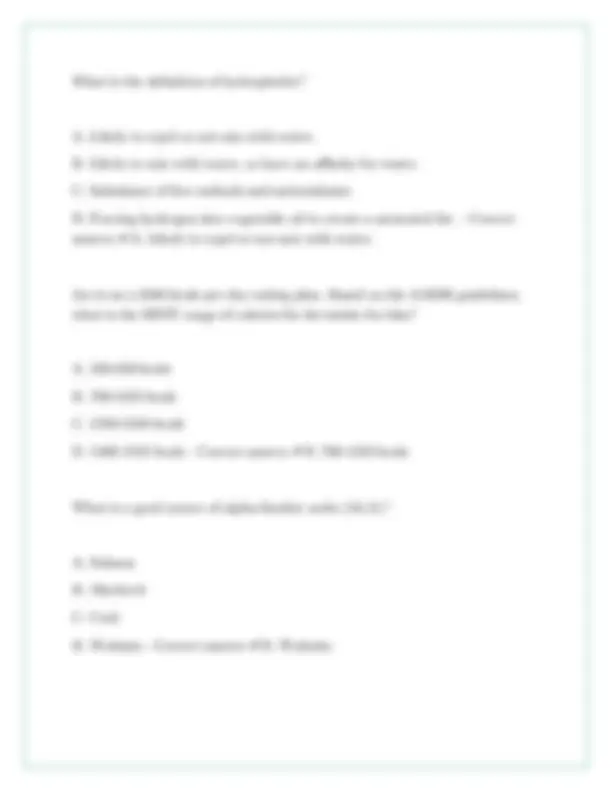
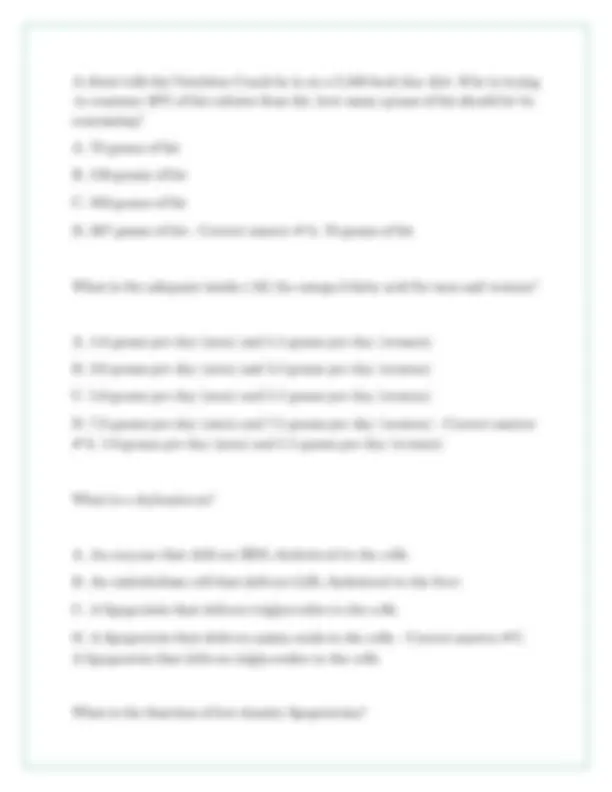
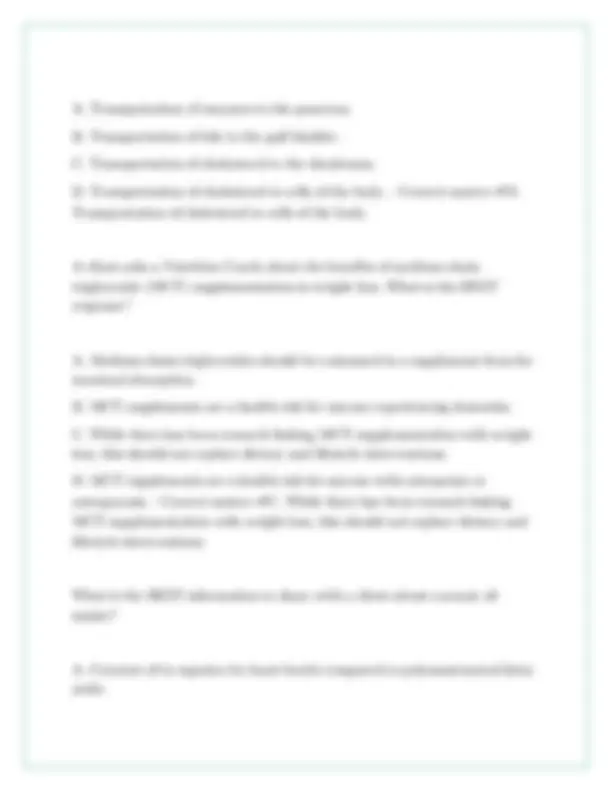
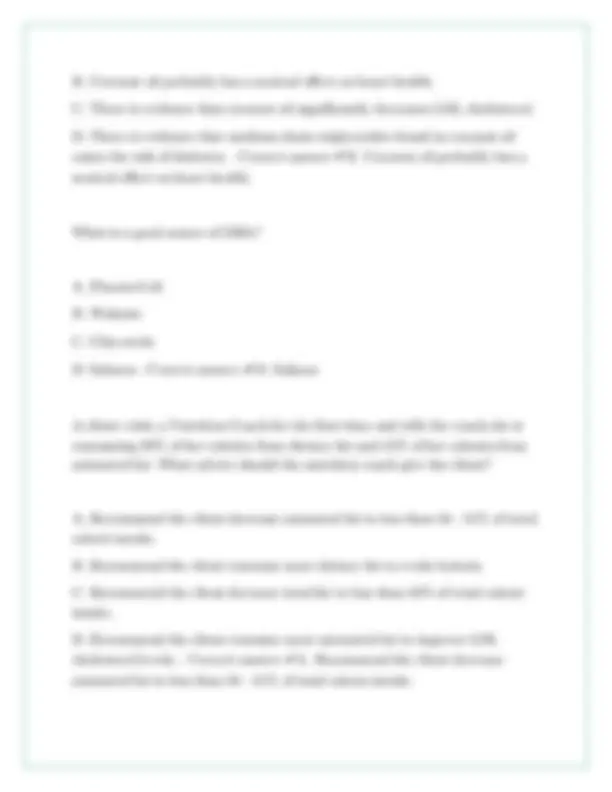
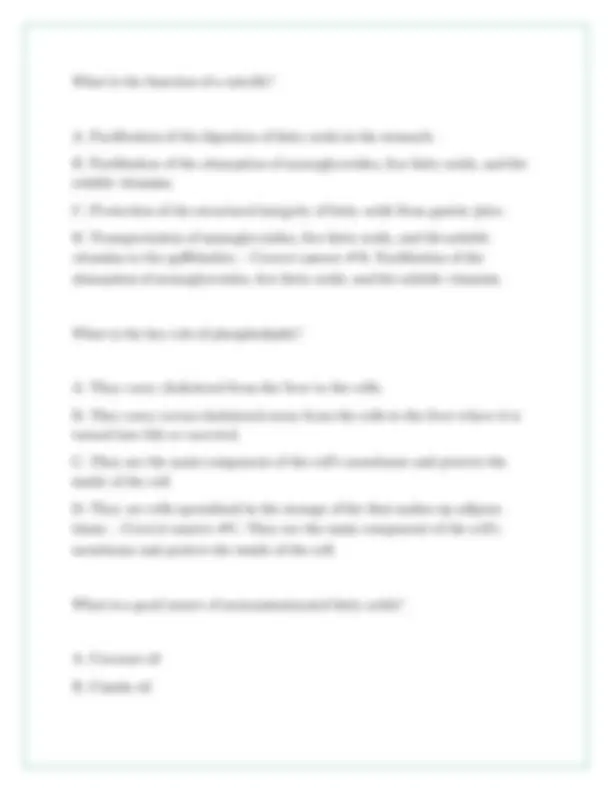
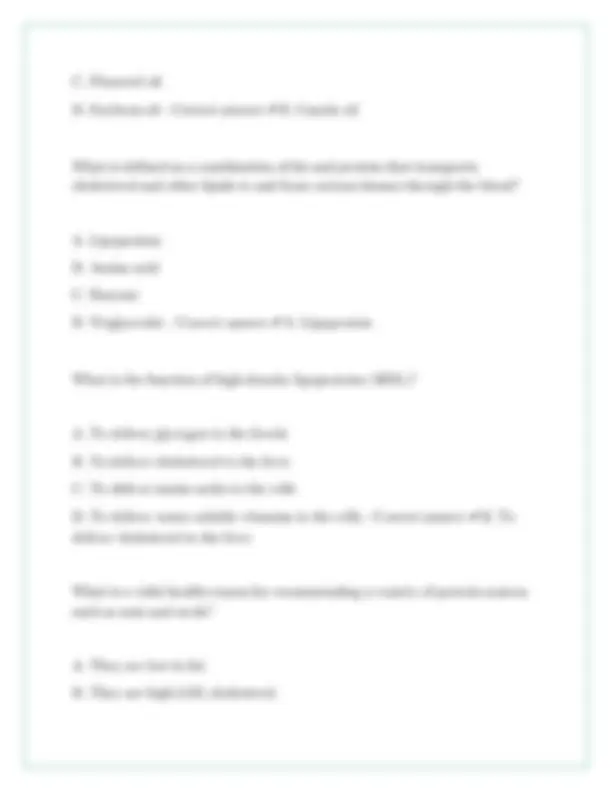
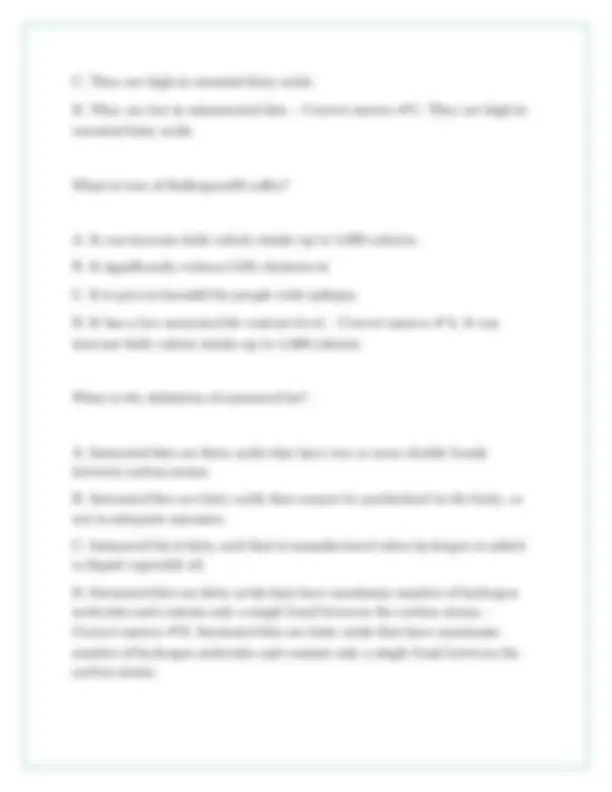
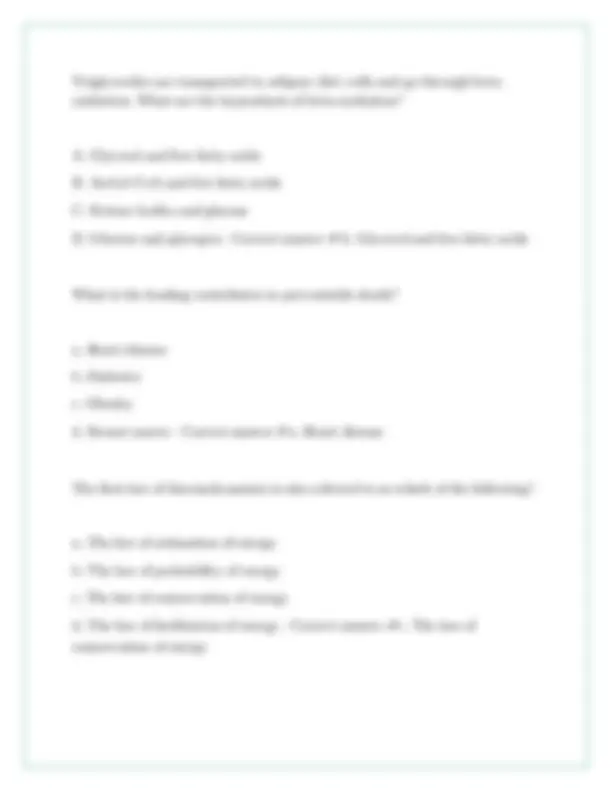
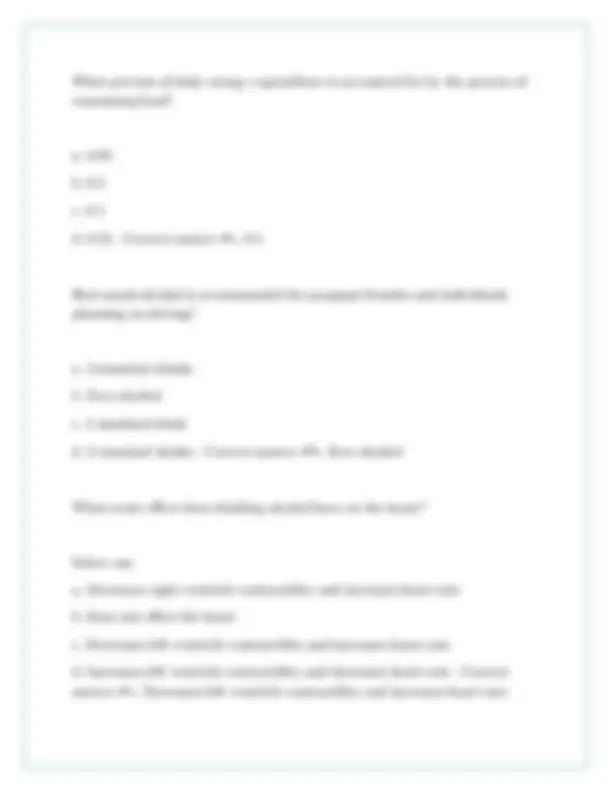
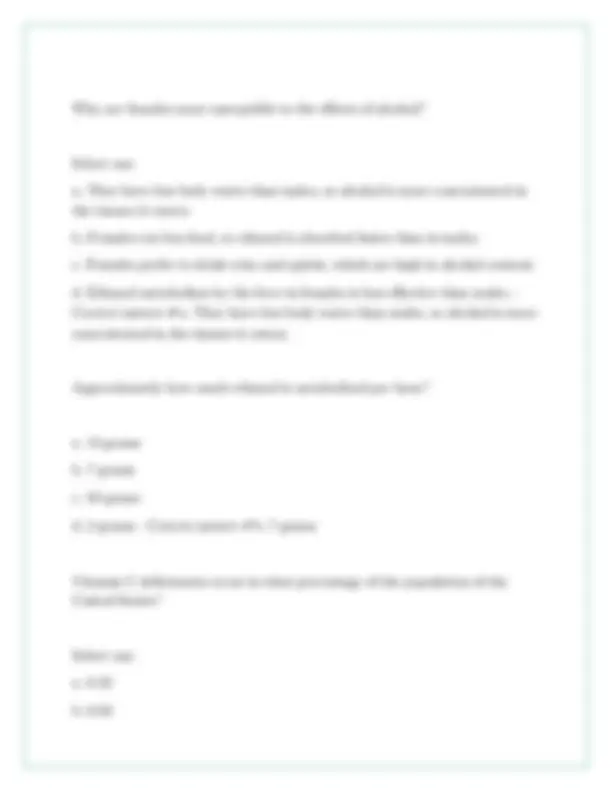
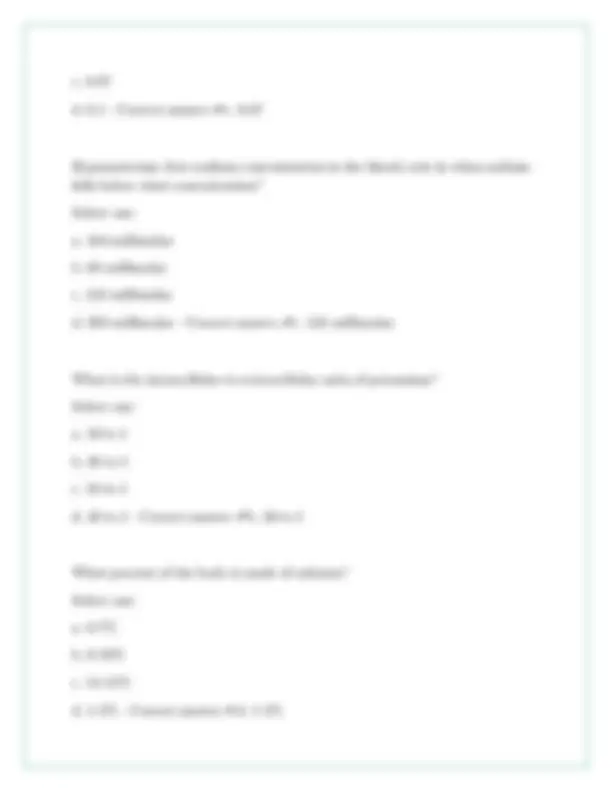
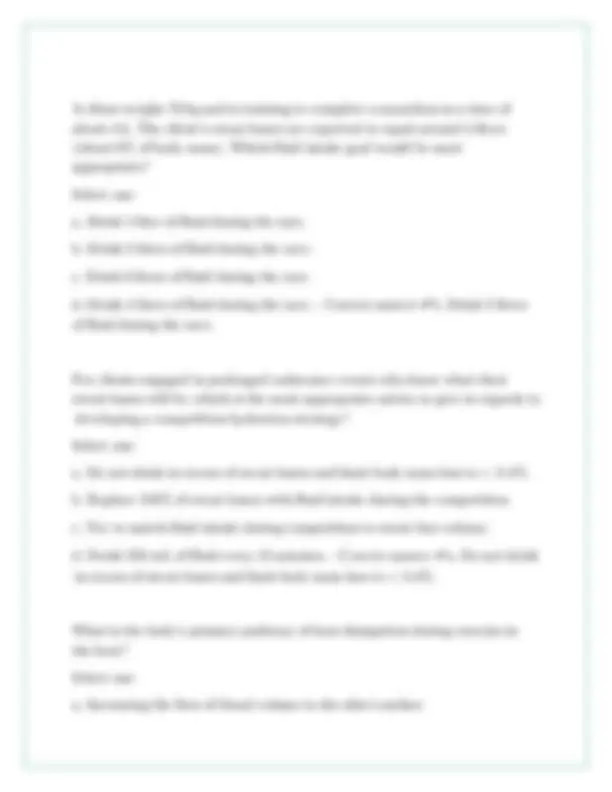
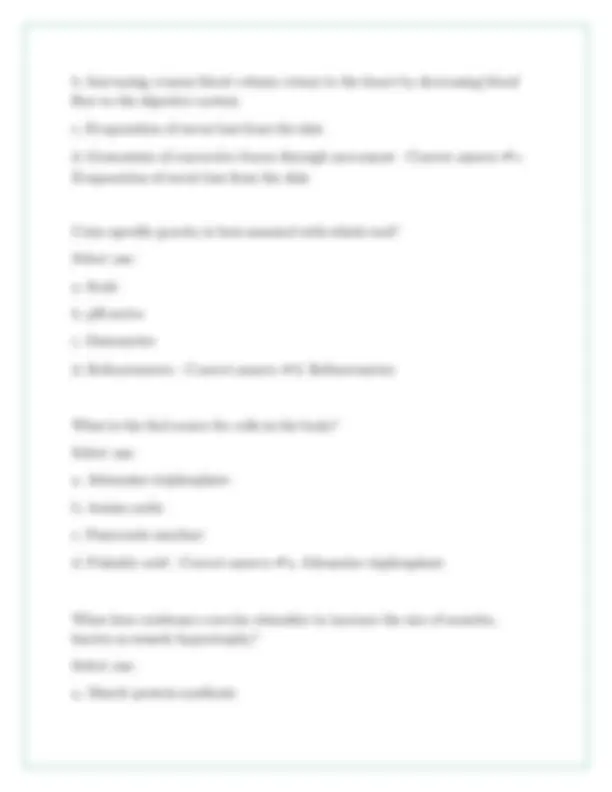
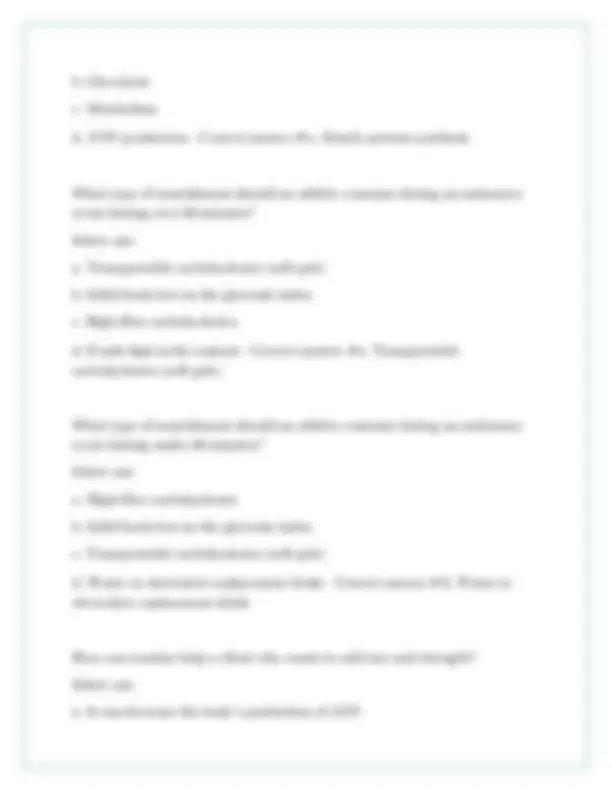
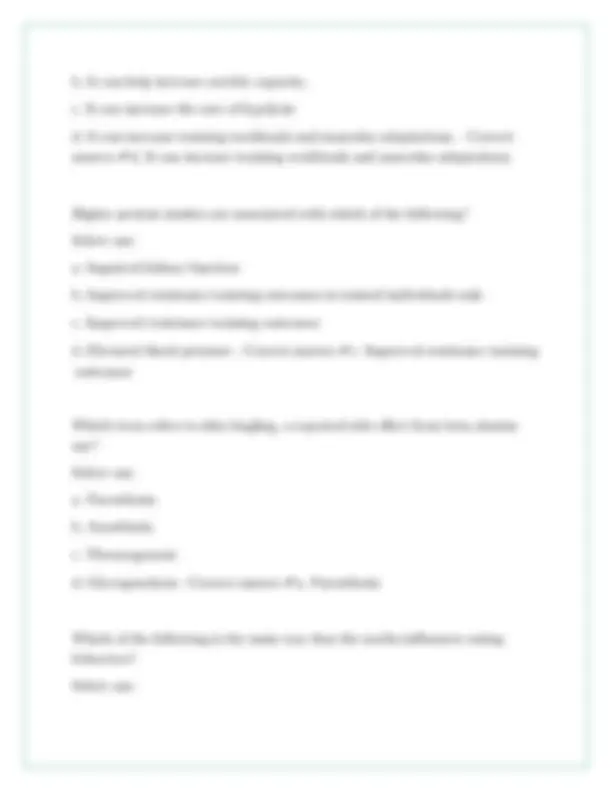
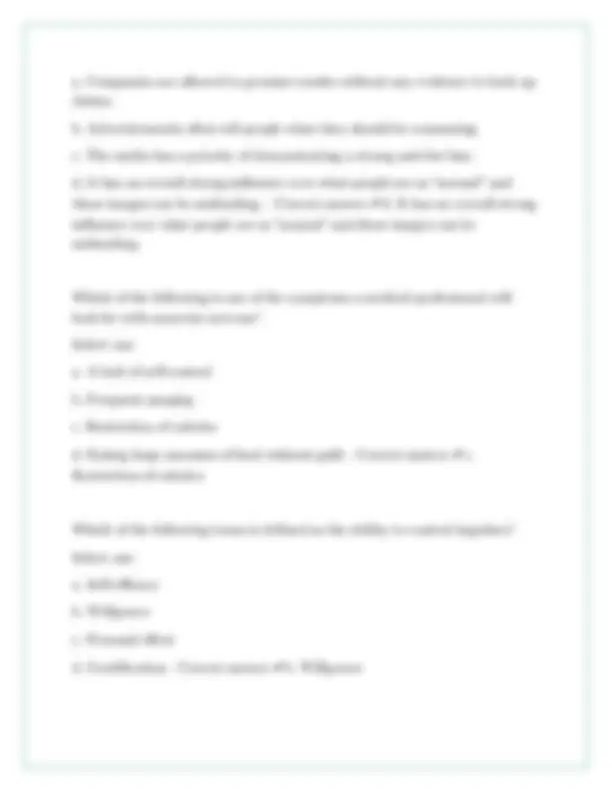
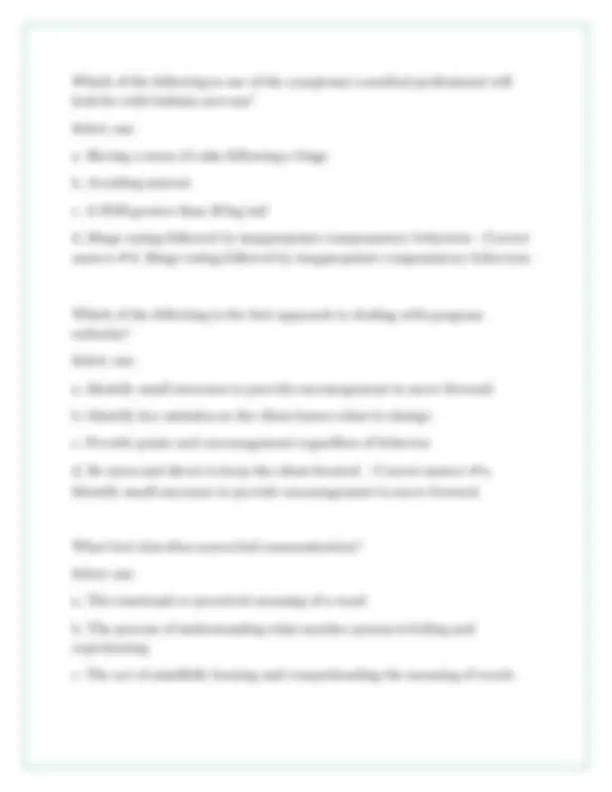
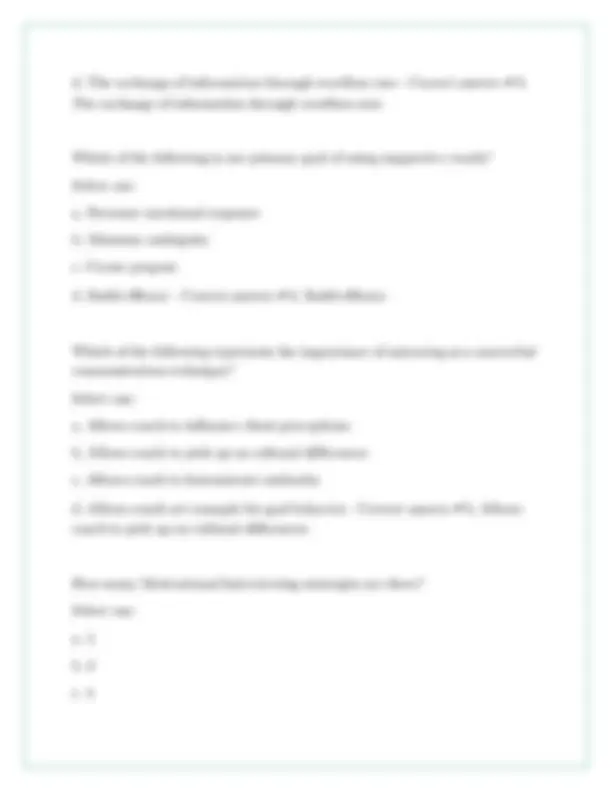
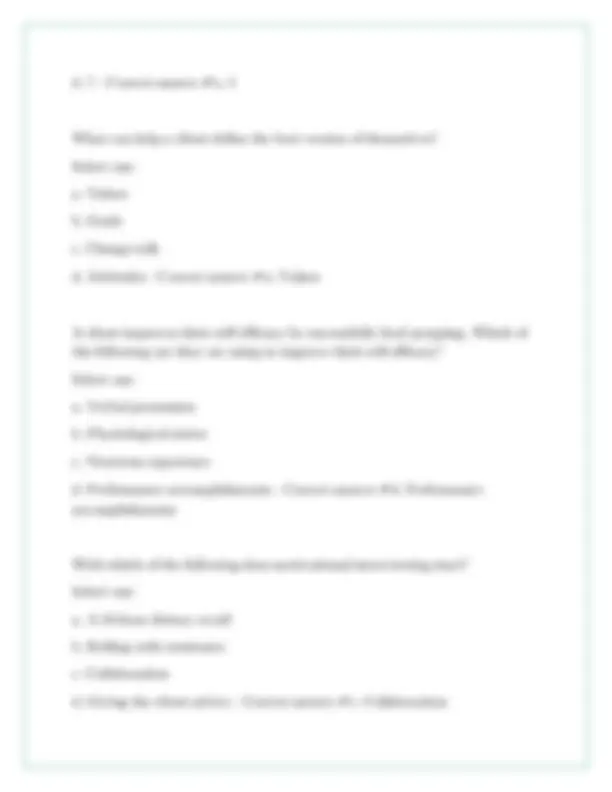
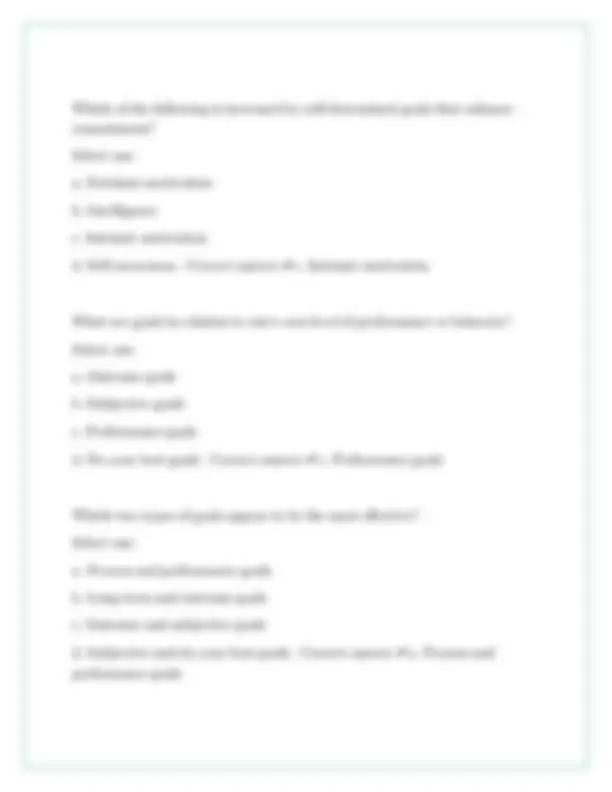
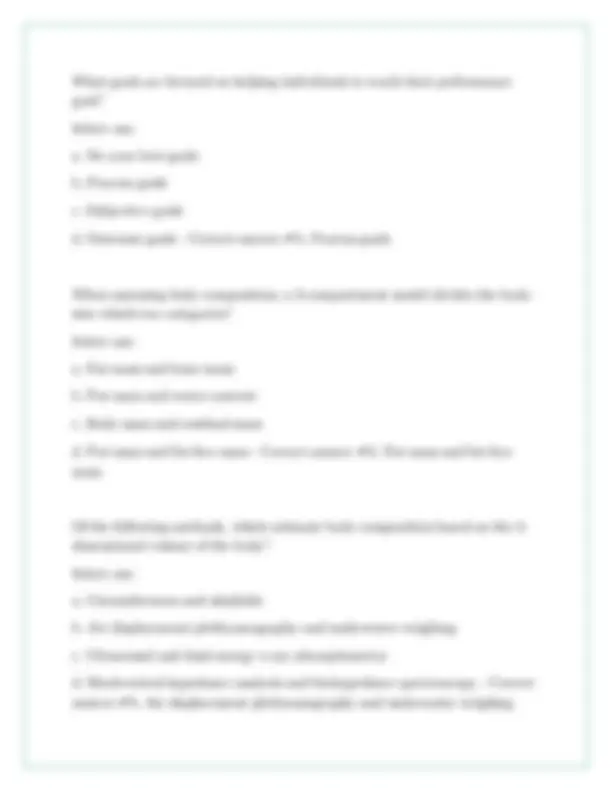
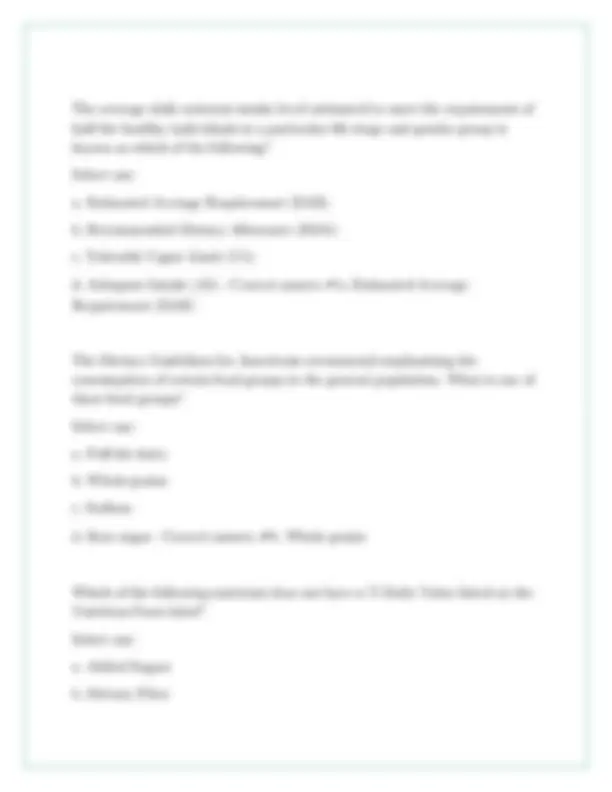
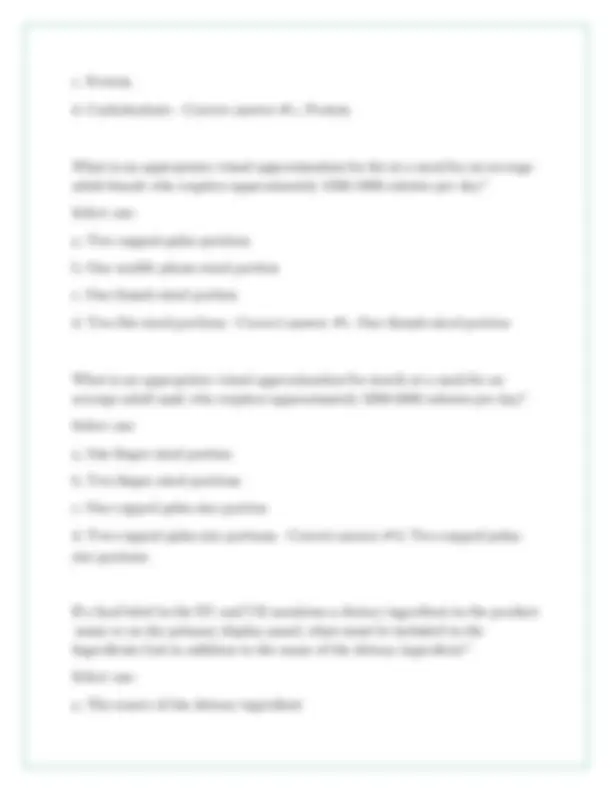
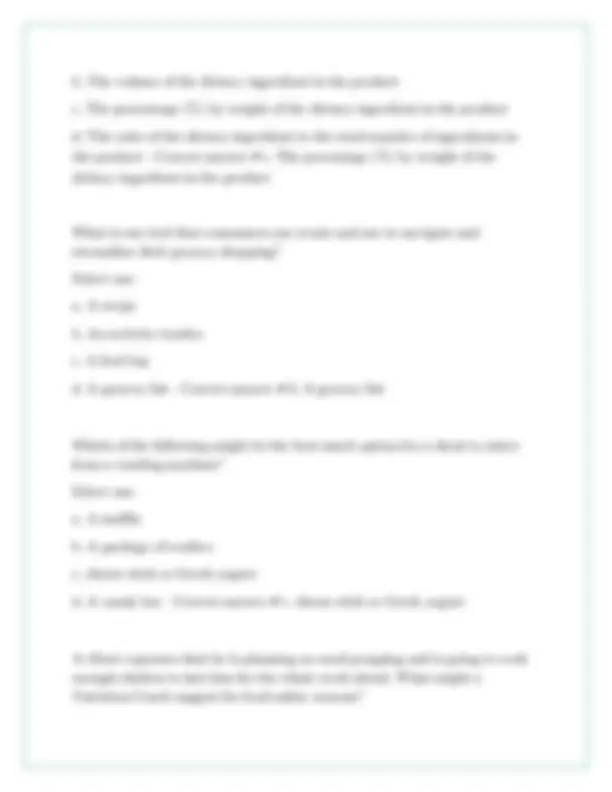
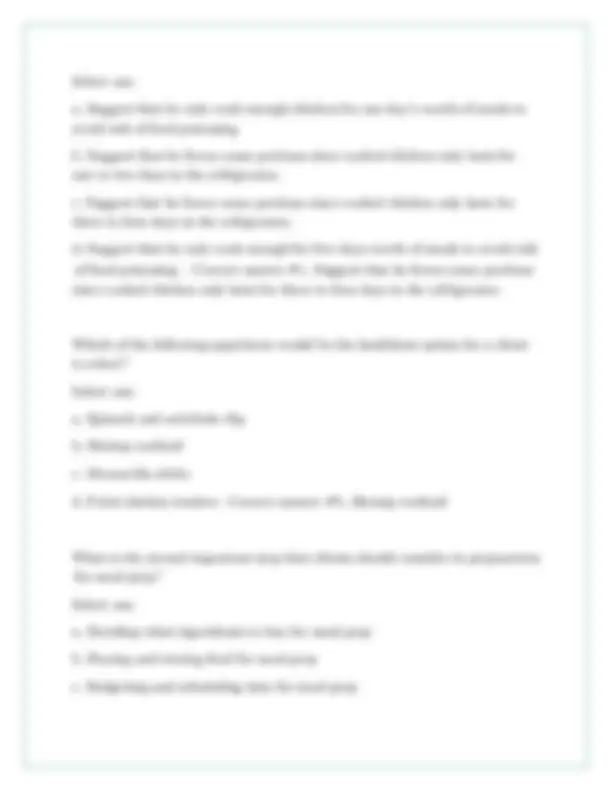
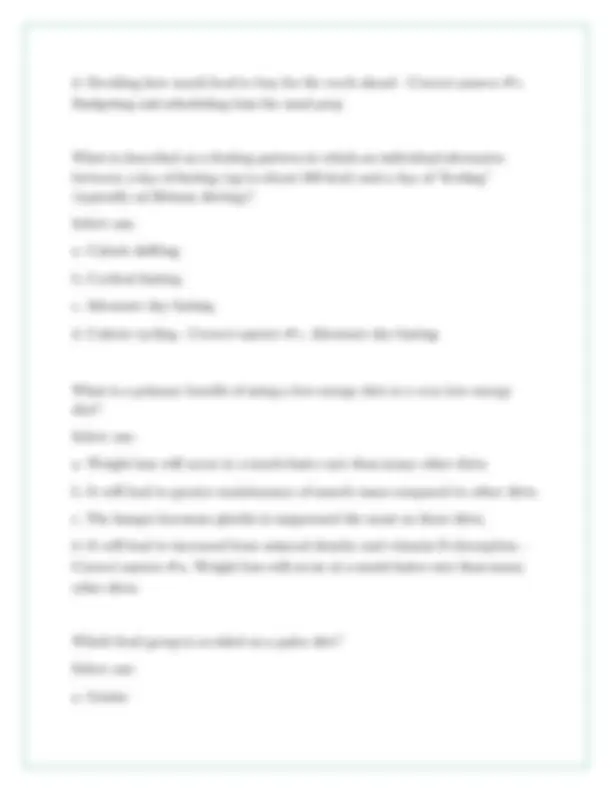
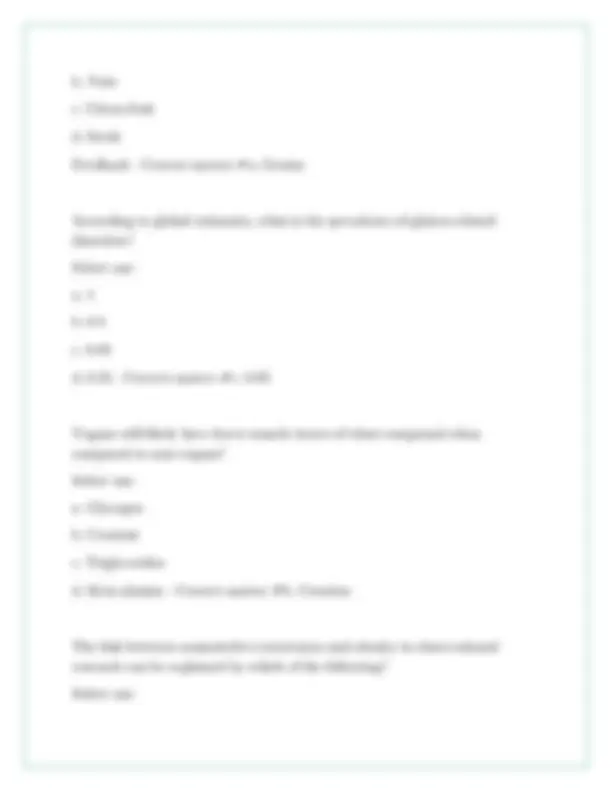
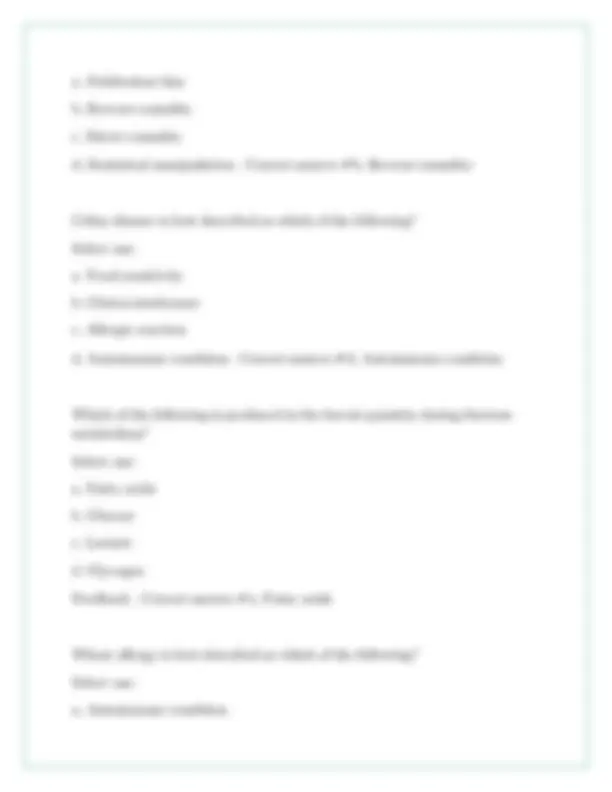
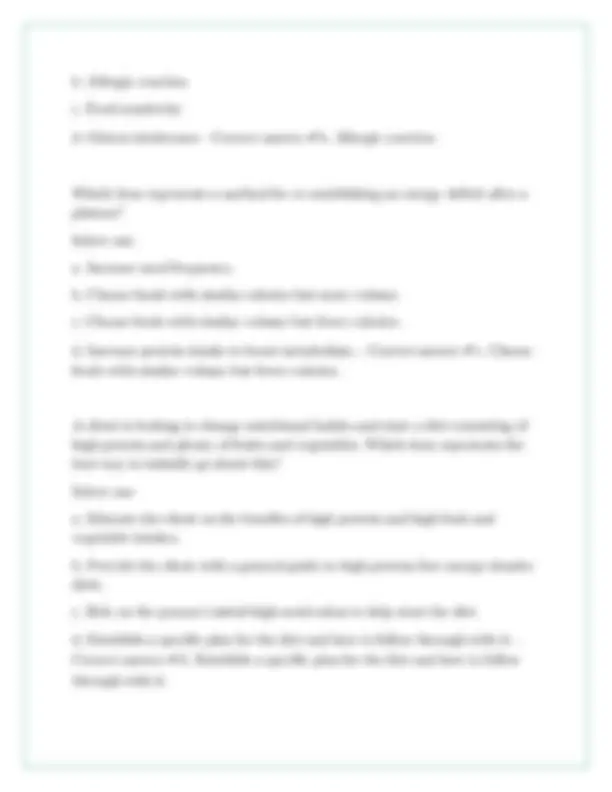
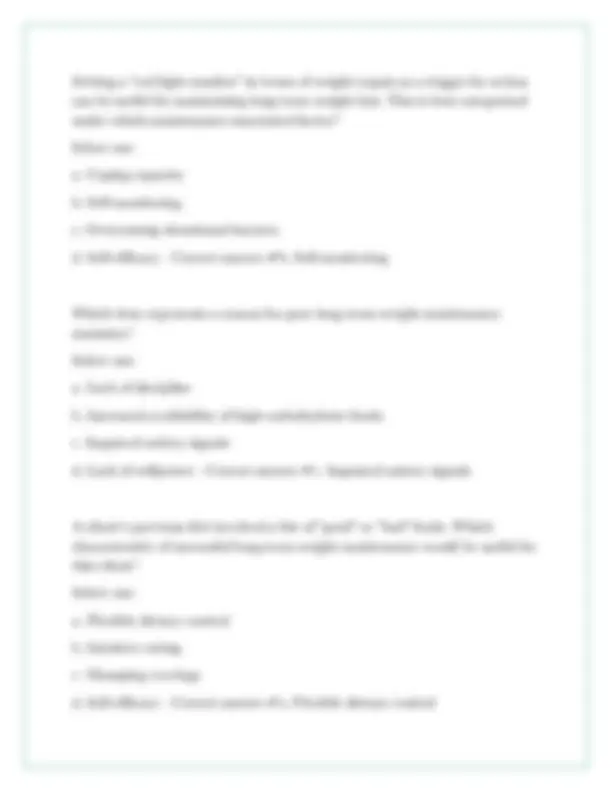
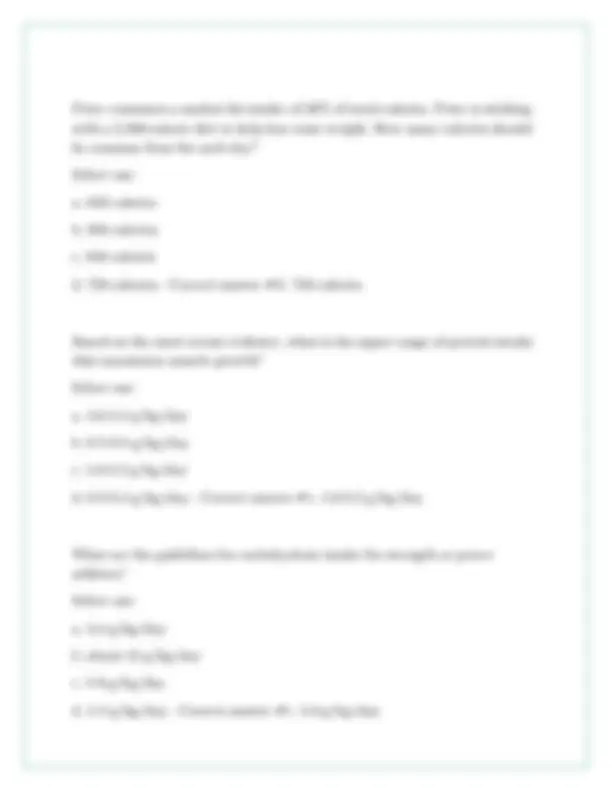
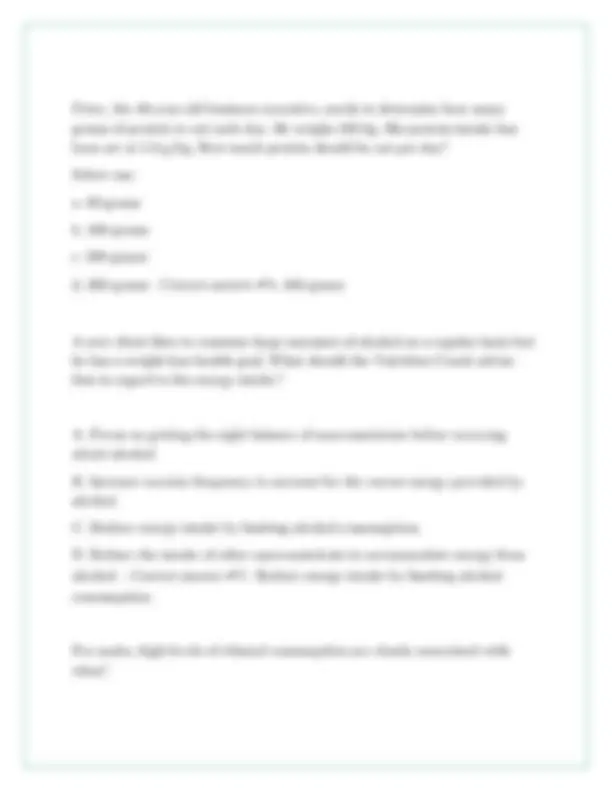
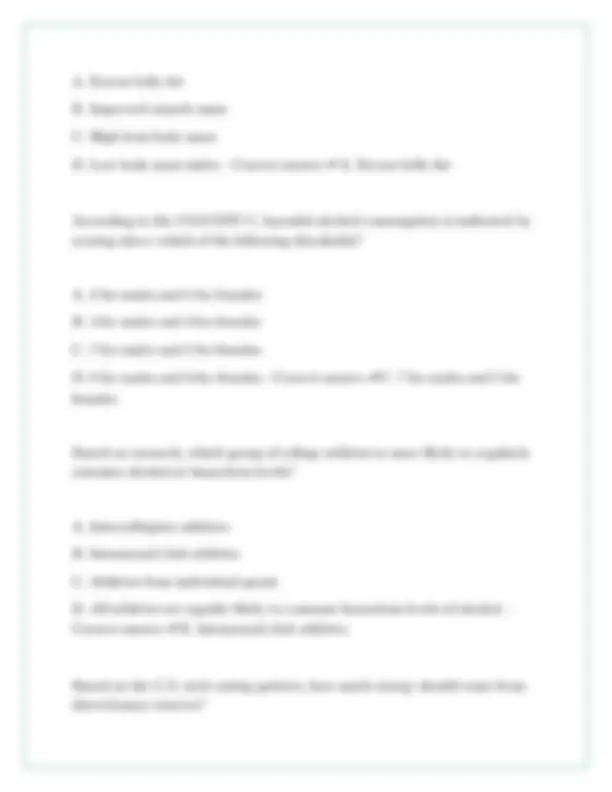
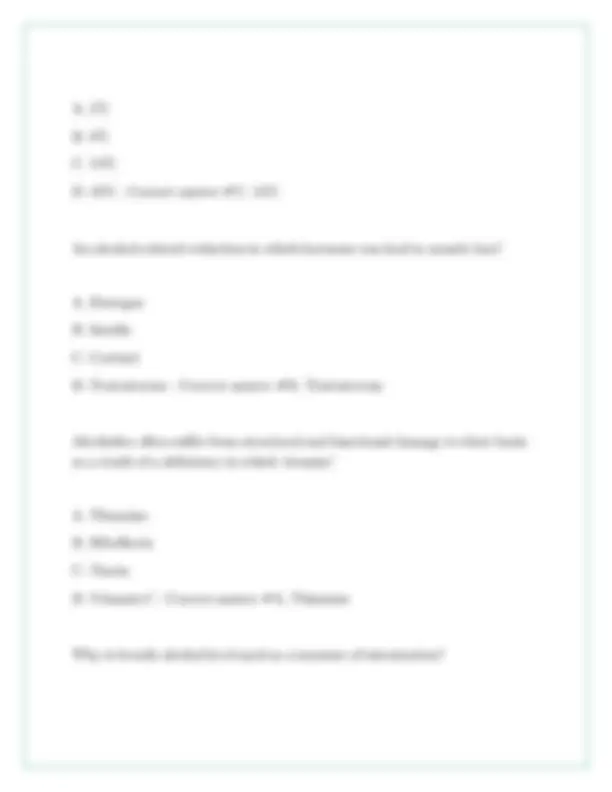
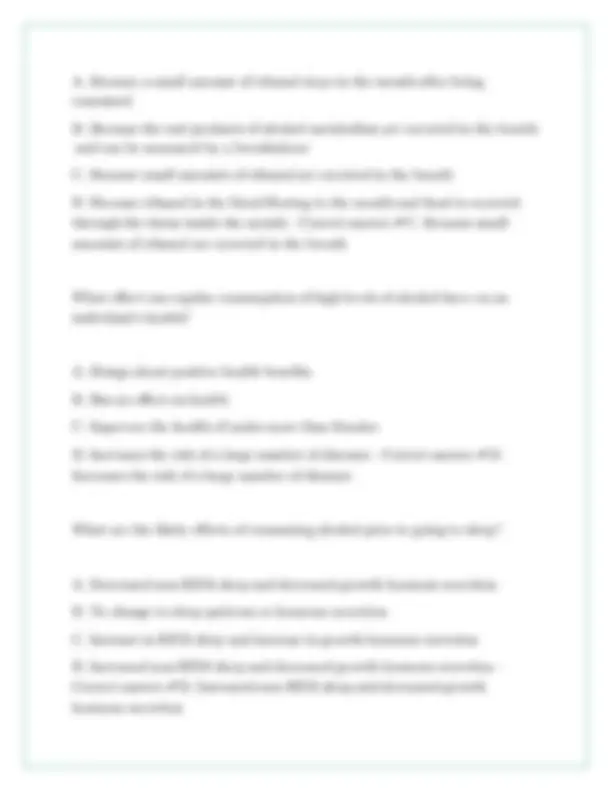


Study with the several resources on Docsity

Earn points by helping other students or get them with a premium plan


Prepare for your exams
Study with the several resources on Docsity

Earn points to download
Earn points by helping other students or get them with a premium plan
Community
Ask the community for help and clear up your study doubts
Discover the best universities in your country according to Docsity users
Free resources
Download our free guides on studying techniques, anxiety management strategies, and thesis advice from Docsity tutors
A study guide for the nasm cnc (certified nutrition coach) final exam. It includes a series of multiple-choice questions with correct answers related to the scope of practice, client interactions, and ethical considerations for nutrition coaches. The questions cover topics such as appropriate referrals, handling client issues, and ensuring client confidentiality. This study guide is designed to help individuals prepare for the nasm cnc certification exam by testing their knowledge of key concepts and principles in nutrition coaching. It offers practical scenarios and guidelines for effective coaching practices, emphasizing the importance of evidence-based advice and ethical conduct. The guide also touches on recognizing and addressing potential eating disorders, highlighting the coach's role in promoting overall client well-being.
Typology: Exams
1 / 127

This page cannot be seen from the preview
Don't miss anything!





























































































When || working || with || a || client || who || has || been || complaining || of || low || back || pain || that || has || been || getting || worse, || what || is || the || most || appropriate || recommendation? A. || Refer || her || to || a || certified || personal || trainer. B. || Tell || her || to || use || a || heating || pad || when || the || pain || gets || bad. C. || Refer || her || to || a || chiropractor. D. || Recommend || use || of || over-the-counter || anti-inflammatory || medications. || - || Correct || answer || ✔C. || Refer || her || to || a || chiropractor. With || which || client || would || it || be || most || appropriate || for || the || Nutrition || Coach || to || work? A. || Elite || clients || competing || in || a || national || Ironman B. || Clients || who || want || testing || for || vitamin || deficiency C. || Clients || with || inconsistent || weight || loss || and || gain D. || Clients || trying || an || elimination || diet || to || identify || food || sensitivities || - || Correct || answer || ✔C. || Clients || with || inconsistent || weight || loss || and || gain
According || to || the || scope || of || practice || for || a || Nutrition || Coach, || which || is || an || example || of || an || appropriate || resource || for || determining || daily || caloric || intake? A. || ADA || calculations || based || on || age, || gender, || and || activity || level B. || Body || type || and || cultural || preferences C. || Dietary || Guidelines || for || Americans D. || The || Nutrition || Coach || cannot || assist || with || daily || caloric || intake. || - || Correct || answer || ✔C. || Dietary || Guidelines || for || Americans During || a || regular || meeting, || a || client || is || complaining || of || irregular || gastrointestinal || issues, || ranging || from || diarrhea || to || constipation. || What || is || the || best || course || of || action? A. || Closely || monitor || his || situation || and || re-evaluate || during || the || next || meeting. B. || Evaluate || his || prescription || medications || to || look || for || similar || side || effects. C. || Advise || him || to || eat || more || vegetables || and || drink || more || water. D. || Advise || him || to || make || an || appointment || with || his || personal || physician. || - || Correct || answer || ✔D. || Advise || him || to || make || an || appointment || with || his || personal || physician. A || new || client || has || just || moved || into || the || area. || She || states || that || she || occasionally || suffers || from || anxiety || and || panic || attacks || and || needs || to || renew || her || prescription || medications. || To || which || healthcare || professional || should || she || be || referred? A. || Podiatrist
A. || Congratulate || her || for || a || job || well || done. B. || Informally || question || her || about || common || eating || disorder || traits/habits. C. || Add || an || additional || 300-500 || calories || to || her || daily || intake. D. || Suggest || she || limit || her || exercise || to || twice || per || week. || - || Correct || answer || ✔B. || Informally || question || her || about || common || eating || disorder || traits/habits. According || to || the || SCOFF || eating || disorder || assessment, || what || is || the || minimum || number || of || positive || answers || which || might || indicate || an || eating || disorder? A. || 1 B. || 2 C. || 3 D. || 5 || - || Correct || answer || ✔B. || 2 A || Nutrition || Coach || is || sitting || down || with || a || new || client || for || her || initial || evaluation. || She || noted || on || her || Health || History || Questionnaire || that || she || has || never || been || able || to || maintain || permanent || weight || loss || and || confides || that || she || has || made || herself || throw || up || after || eating || large || meals. || What || is || the || best || course || of || action? A. || Refer || her || to || a || clinical || psychologist. B. || Tell || her || she || has || bulimia || and || refer || her || to || a || Certified || Eating || Disorder || Specialist. C. || Tell || her || she || may || have || anorexia || and || refer || her || to || a || Certified || Eating || Disorder || Specialist.
D. || Move || forward || with || the || client || sessions || but || monitor || her || closely || for || any || more || self-induced || vomiting. || - || Correct || answer || ✔A. || Refer || her || to || a || clinical || psychologist With || which || client || would || it || be || most || appropriate || for || the || Nutrition || Coach || to || work? A. || Overweight || client || who || wants || to || train || for || a || 10K B. || Client || who || wants || nutrition || therapy || for || cancer || prevention C. || Pre-pubescent || teenager || who || is || overweight D. || Client || who || wants || accountability || during || a || 9-week || extreme || calorie- restricted || diet || - || Correct || answer || ✔A. || Overweight || client || who || wants || to || train || for || a || 10K Which || of || the || following || can || a || Nutrition || Coach || provide? A. || Nutritional || advice || and || behavioral || modification B. || Nutritional || advice || and || behavioral || counseling C. || Nutritional || advice || and || behavioral || prognosis D. || Nutritional || advice || and || behavioral || prescriptions || - || Correct || answer || ✔A. || Nutritional || advice || and || behavioral || modification To || ensure || the || client || is || retaining || any || shared || information, || it || is || important || that || the || content || presented || is || perceived || to || be || important || and || what || other || quality?
B. || The || many || disciplines || that || make || up || the || healthcare || system C. || The || number || of || physician || specialists || that || are || in || the || healthcare || system D. || The || type || of || alternative || health || practices || that || are || legitimately || recognized || - || Correct || answer || ✔B. || The || many || disciplines || that || make || up || the || healthcare || system A || new || client || is || 6-weeks || post-partum. || She || states || that || she || has || very || little || energy || and || feels || sadness || most || of || the || time. || What || is || the || most || appropriate || course || of || action? A. || Call || 911. B. || Contact || her || spouse || to || discuss || options. C. || Refer || her || to || a || clinical || psychiatrist. D. || Closely || monitor || her || situation. || - || Correct || answer || ✔C. || Refer || her || to || a || clinical || psychiatrist. Which || statement || is || within || the || scope || of || practice || for || a || Nutrition || Coach? A. || Design || a || 5-day || meal || plan || for || a || healthy || client. B. || Recommend || the || client || discuss || supplement || usage || and || dosing || with || their || pharmacist || or || physician. C. || Recommend || a || diet || that || contains || up || to || 50% || protein. D. || Provide || general || advice || on || a || 3-day || detox || plan. || - || Correct || answer || ✔B. || Recommend || the || client || discuss || supplement || usage || and || dosing || with || their || pharmacist || or || physician.
Common || assessments || performed || by || a || Nutrition || Coach || include || height, || weight, || body || composition, || and || what || other || test? A. || Blood || pressure B. || Anthropometric || measurements C. || Hydrostatic || weighing D. || SCOFF || test || - || Correct || answer || ✔B. || Anthropometric || measurements Where || might || a || Nutrition || Coach || find || reputable || information || on || recent || dietary || guidelines? A. || Popular || magazines B. || Government-funded || agencies C. || Private, || for-profit || supplement || companies D. || Celebrity || blogs || - || Correct || answer || ✔B. || Government-funded || agencies Clients || often || confide || in || the || Nutrition || Coach. || Which || client || conversation || would || be || grounds || for || a || referral || to || a || licensed || healthcare || professional? A. || Slow || weight || loss || of || 1/2 || pound || per || week || (0.22 || kg) B. || Late-night || ice || cream || binging C. || Chronic || fatigue D. || Occasional || sleeplessness || - || Correct || answer || ✔C. || Chronic || fatigue
C. || Tell || her || to || save || her || money || and || stay || away || from || herbal || remedies. D. || Tell || her || to || follow || the || guidelines || of || the || books || she || read. || - || Correct || answer || ✔B. || Refer || her || to || a || pharmacist || or || her || physician. A || Nutrition || Coach || is || sitting || down || with || a || new || client || for || her || initial || evaluation. || She || noted || on || her || Health || History || Questionnaire || that || she || has || diabetes || and || she || has || trouble || keeping || her || blood || glucose || controlled. || What || is || the || best || course || of || action? A. || Advise || her || to || cut || back || on || her || simple || carbohydrates || at || each || meal. B. || Inform || her || that || when || she || loses || 10% || of || her || body || weight, || her || blood || glucose || will || be || easier || to || manage. C. || Refer || her || to || a || Registered || Dietitian. D. || Refer || her || to || a || Certified || Diabetes || Educator. || - || Correct || answer || ✔D. || Refer || her || to || a || Certified || Diabetes || Educator. Scientists || perform || a || diet || study || in || which || they || assign || half || the || people || to || a || continuous || dieting || group || and || the || other || half || to || an || intermittent || fasting || group. || Which || term || best || describes || this || study || design? A. || Observational B. || Crossover C. || Parallel D. || Factorial || - || Correct || answer || ✔C. || Parallel Which || of || the || following || is || an || example || of || descriptive || research?
A. || Cohort || study B. || Survey C. || Randomized || controlled || trial D. || Meta-analysis || - || Correct || answer || ✔B. || Survey Scientists || perform || a || study || comparing || 1000 || women || with || breast || cancer || to || 1000 || women || without || breast || cancer. || They || gather || information || on || the || women's || diets || and || look || to || see || if || the || women || diagnosed || with || breast || cancer || had || more || fat || in || their || diet || compared || to || the || women || who || did || not || get || cancer. || Which || term || best || describes || this || study? A. || Cross-sectional || study B. || Case-control || study C. || Cohort || study D. || Survey || - || Correct || answer || ✔B. || Case-control || study Which || term || best || describes || formulation || of || a || hypothesis, || collecting || data || to || test || the || hypothesis, || and || changing || or || discarding || the || hypothesis || when || the || data || does || not || support || it? A. || Evidence-based || practice B. || Primary || research C. || Science D. || Scientific || method || - || Correct || answer || ✔D. || Scientific || method
A. || Survey B. || Cross-sectional || study C. || Case-control || study D. || Cohort || study || - || Correct || answer || ✔D. || Cohort || study Scientists || gather || 20 || studies || looking || at || the || relationship || between || protein || intake || and || lean || body || mass, || and || then || they || statistically || analyze || them || together || as || a || group. || What || type || of || study || is || this? A. || Narrative || review B. || Observational || research C. || Randomized || controlled || trials D. || Meta-analysis || - || Correct || answer || ✔D. || Meta-analysis Scientists || randomly || assign || subjects || to || a || low || or || high || carbohydrate || group || and || then || look || at || changes || in || body || weight || over || 3 || months. || Which || item || represents || the || independent || variable || in || this || study? A. || Length || of || study || (3 || months) B. || Body || weight C. || Diet || type D. || Subjects || - || Correct || answer || ✔C. || Diet || type A || scientist || proposes || that || sugar || is || inherently || fattening, || independent || of || its || calorie || content. || If || that || proposal || is || true, || then || that || would || mean || that || high-
sugar || diets || should || increase || fat || gain || independent || of || their || calorie || content. || What || term || describes || this || potential || consequence? A. || Theory B. || Hypothesis C. || Prediction D. || Conclusion || - || Correct || answer || ✔C. || Prediction Which || observational || study || design || allows || scientists || to || hypothesize || a || potential || causal || association? A. || Case || study B. || Cross-sectional || study C. || Case-control || study D. || Cohort || study || - || Correct || answer || ✔D. || Cohort || study Which || of || the || following || represents || a || critical || evaluation || of || a || study || by || other || scientists? A. || Systematic || review B. || Peer || review C. || Narrative || review D. || Scientific || method || - || Correct || answer || ✔B. || Peer || review
D. || Test-retest || reliability || - || Correct || answer || ✔C. || External || validity Which || item || represents || a || high || quality, || non-peer || reviewed || source || of || information? A. || Narrative || Review B. || Systematic || Review C. || Academic || Textbook D. || Position || Stand || - || Correct || answer || ✔C. || Academic || Textbook Which || term || refers || to || a || hypothesis || or || set || of || hypotheses || for || which || a || large || body || of || high || quality || evidence || has || been || accumulated? A. || Randomized || controlled || trial B. || Prediction C. || Scientific || method D. || Theory || - || Correct || answer || ✔D. || Theory Scientists || randomly || assign || subjects || to || a || low || or || high || carbohydrate || group || and || then || look || at || changes || in || body || weight || over || 3 || months. || Which || item || represents || the || independent || variable || in || this || study? A. || Length || of || study || (3 || months) B. || Body || weight C. || Subjects
D. || Diet || type || - || Correct || answer || ✔D. || Diet || type Scientists || perform || a || study || looking || at || the || effects || of || caffeine || on || vertical || jump || performance. || On || one || day, || they || give || all || the || subjects || caffeine || followed || by || vertical || jump || tests. || Two || weeks || later, || they || give || all || the || subjects || a || placebo || followed || by || the || same || vertical || jump || tests. || Which || term || best || describes || this || study || design? A. || Factorial B. || Crossover C. || Parallel D. || Observational || - || Correct || answer || ✔B. || Crossover Which || term || encompasses || the || weight || of || the || scientific || evidence, || field || observations, || and || individual || client || needs? A. || Primary || research B. || Science C. || Scientific || method D. || Evidence-based || practice || - || Correct || answer || ✔D. || Evidence-based || practice Which || of || the || following || represents || the || lowest || level || of || evidence?
B. || Selection || bias C. || Test-retest || reliability D. || Reliability || - || Correct || answer || ✔A. || External || validity Seven || studies || show || Diet || A || lowers || cholesterol || more || than || Diet || B. || Three || studies || show || no || difference. || Assuming || all || the || studies || are || equivalent || in || quality, || which || item || best || describes || this || situation? A. || The || weight || of || the || evidence || suggests || Diet || A || is || more || effective || for || lowering || cholesterol || than || Diet || B, || but || more || data || is || needed. B. || There || are || insufficient || studies || to || conclude || that || Diet || A || lowers || cholesterol || more || than || Diet || B. C. || It || is || unknown || whether || Diet || A || lowers || cholesterol || more || than || Diet || B. D. || The || weight || of || the || evidence || suggests || that || Diet || A || and || B || are || equivalent || in || their || ability || to || lower || cholesterol. || - || Correct || answer || ✔A. || The || weight || of || the || evidence || suggests || Diet || A || is || more || effective || for || lowering || cholesterol || than || Diet || B, || but || more || data || is || needed. Scientists || gather || 20 || studies || looking || at || the || relationship || between || protein || intake || and || lean || body || mass, || and || then || they || statistically || analyze || them || together || as || a || group. || What || type || of || study || is || this? A. || Narrative || review B. || Meta-analysis C. || Randomized || controlled || trials D. || Observational || research || - || Correct || answer || ✔B. || Meta-analysis
A || scientist || proposes || that || sugar || is || inherently || fattening, || and || performs || a || study || comparing || a || high-sugar || diet || to || a || low-sugar || diet || with || equal || calories. || He || finds || that || fat || gain || was || the || same || between || the || diets. || Which || term || describes || how || this || study || effects || the || initial || proposal? A. || Falsification B. || Scientific || method C. || Prediction D. || Validity || - || Correct || answer || ✔A. || Falsification A || scientist || observes || that || people || tend || to || perform || better || in || a || weight || training || session || after || consuming || a || pre-workout || supplement. || The || scientist || proposes || that || the || caffeine || in || the || supplement || is || increasing || arousal, || leading || to || increased || performance. || Which || term || best || describes || this || scientist's || proposal? A. || Prediction B. || Hypothesis C. || Theory D. || Conclusion || - || Correct || answer || ✔B. || Hypothesis Scientists || take || 5000 || people || and || have || them || fill || out || questionnaires || on || their || dairy || intake. || They || then || compare || cancer || rates || between || people || with || high || intakes || and || low || intakes. || What || type || of || study || is || this? A. || Observational B. || Randomized || controlled || trial